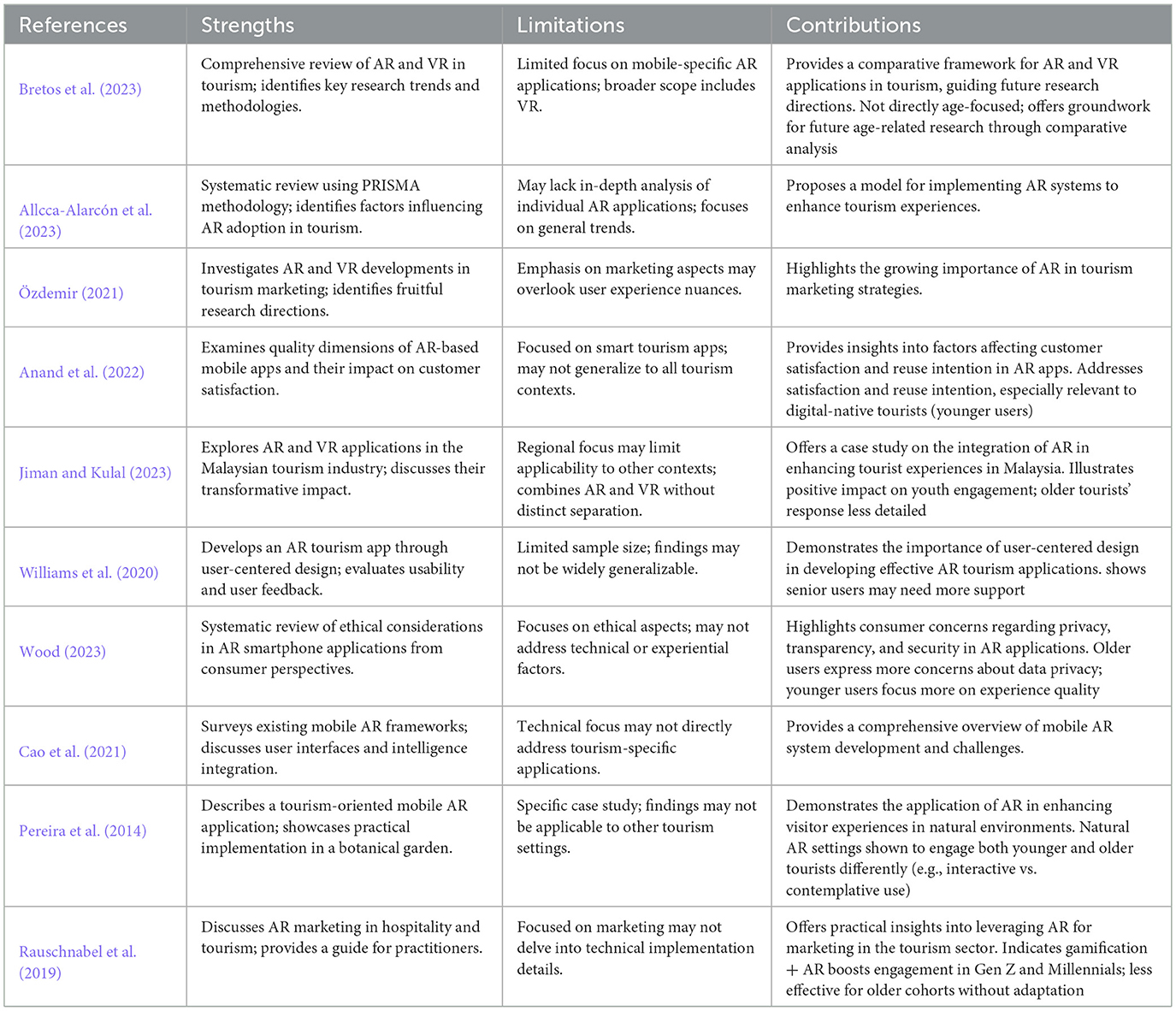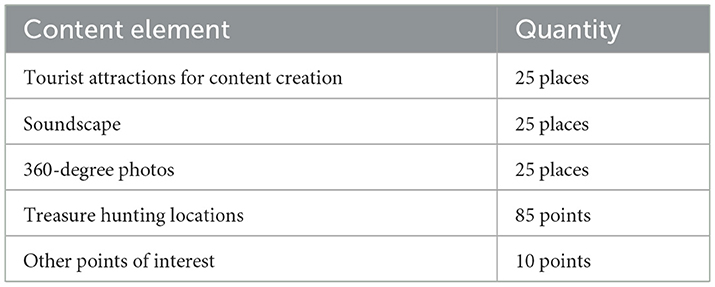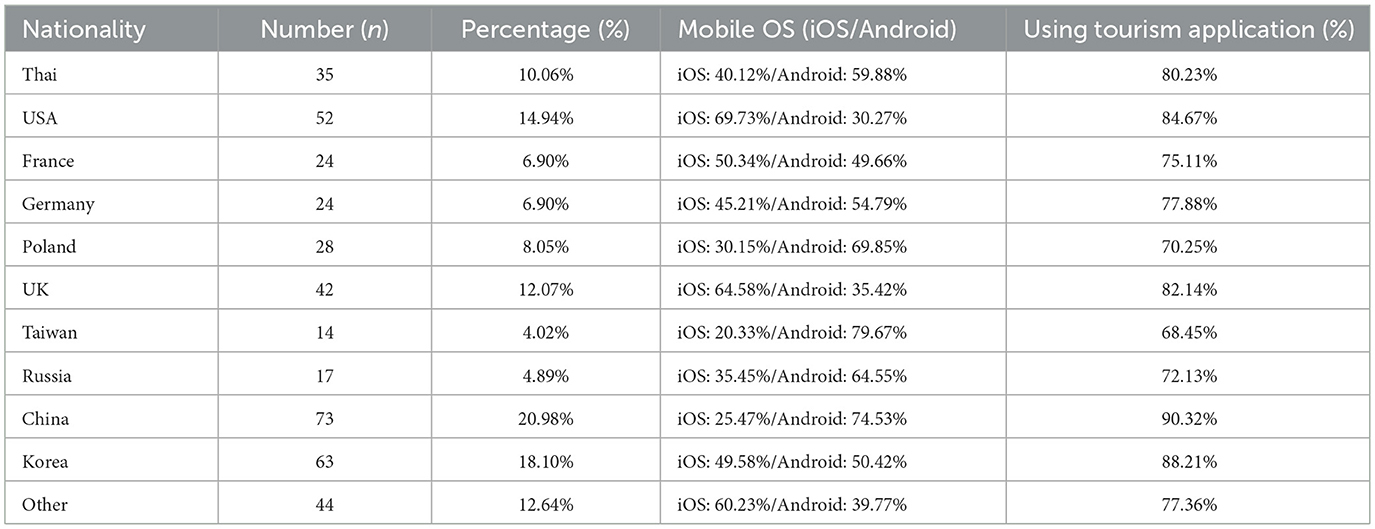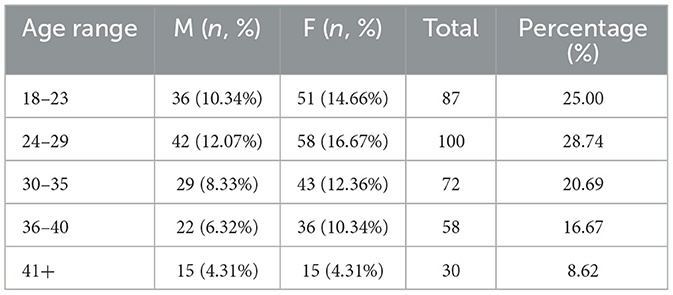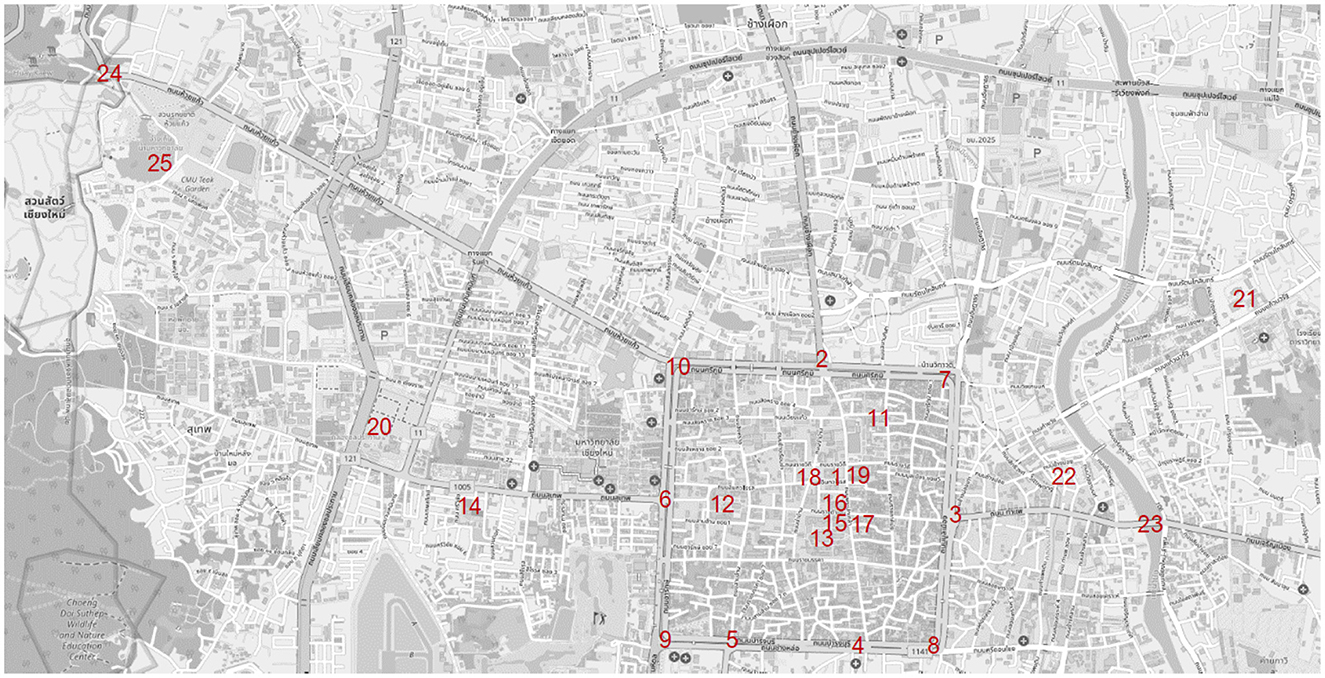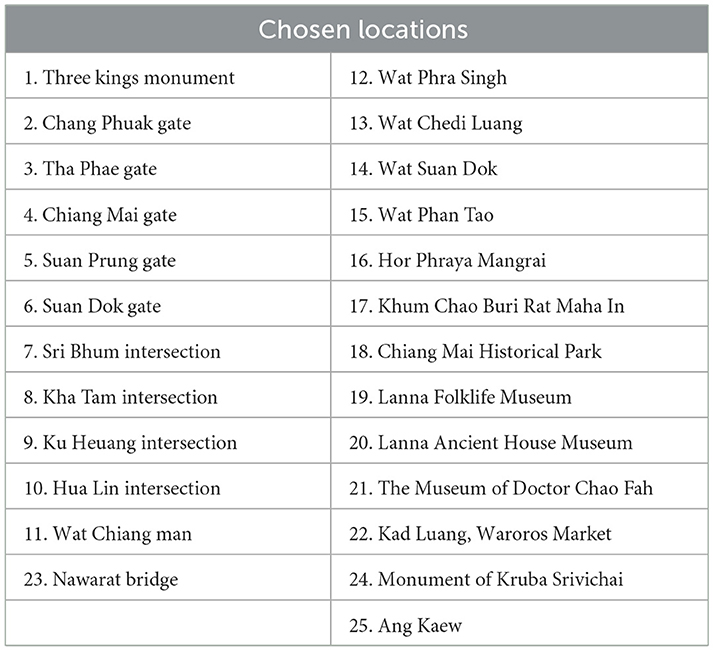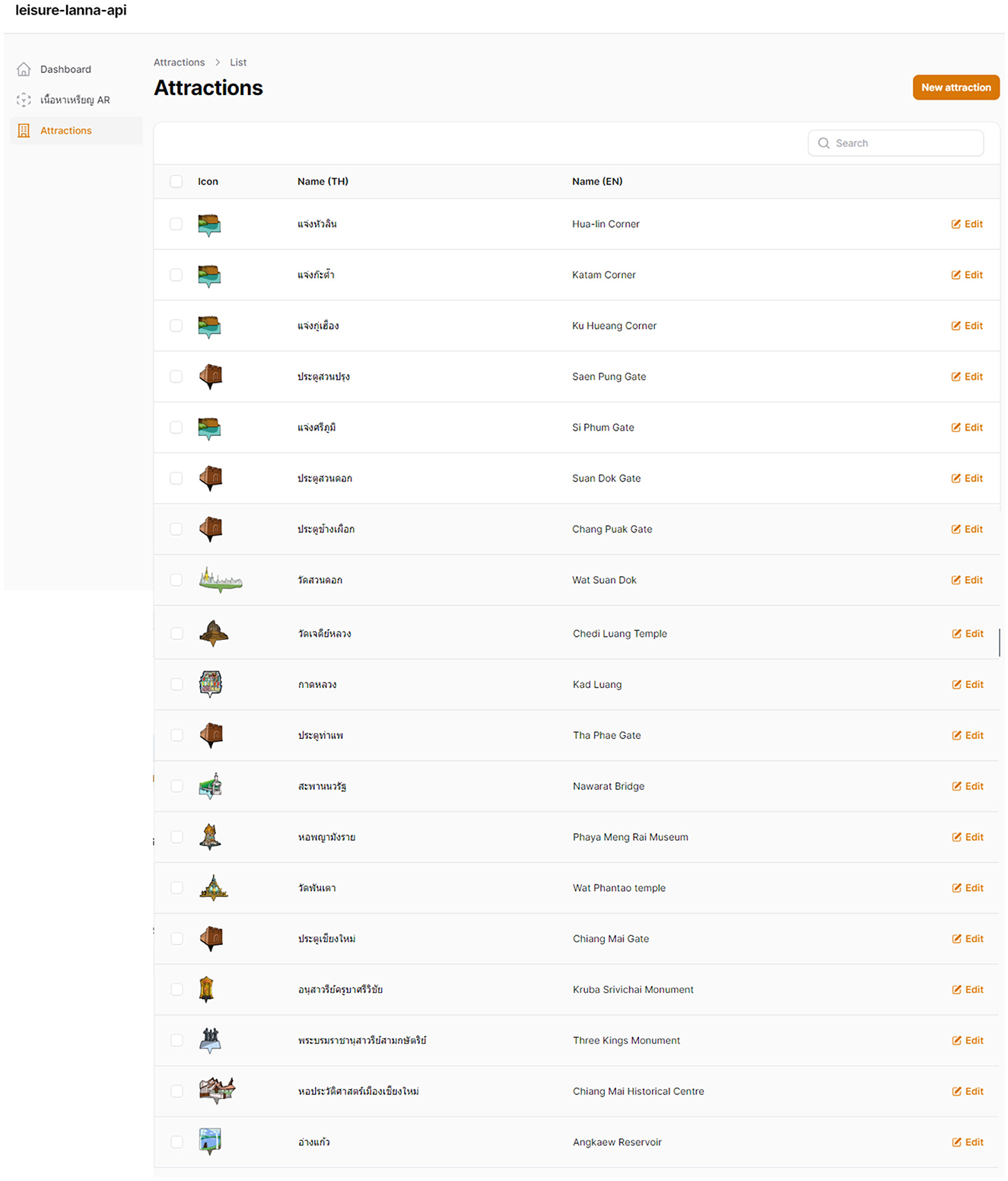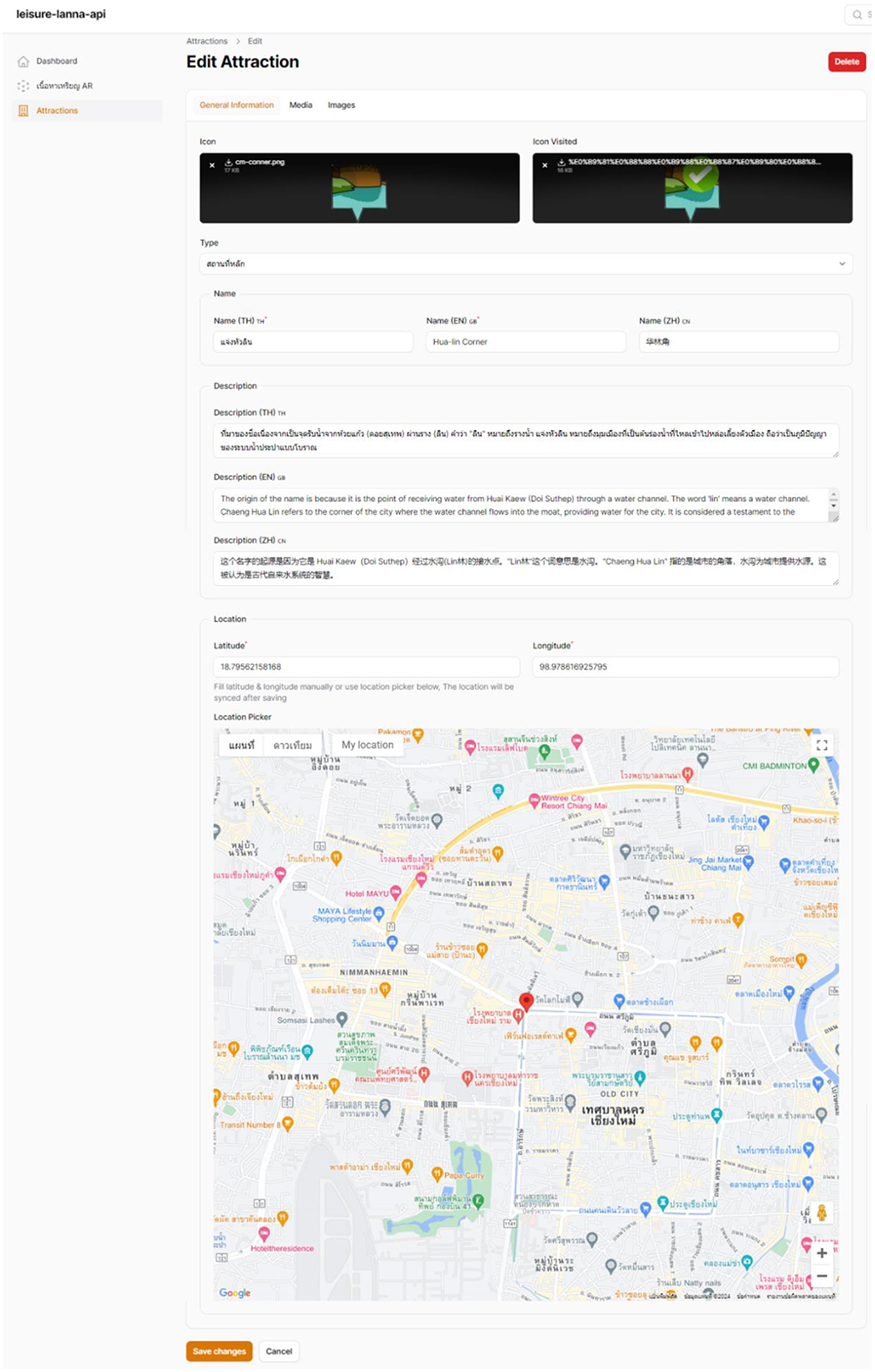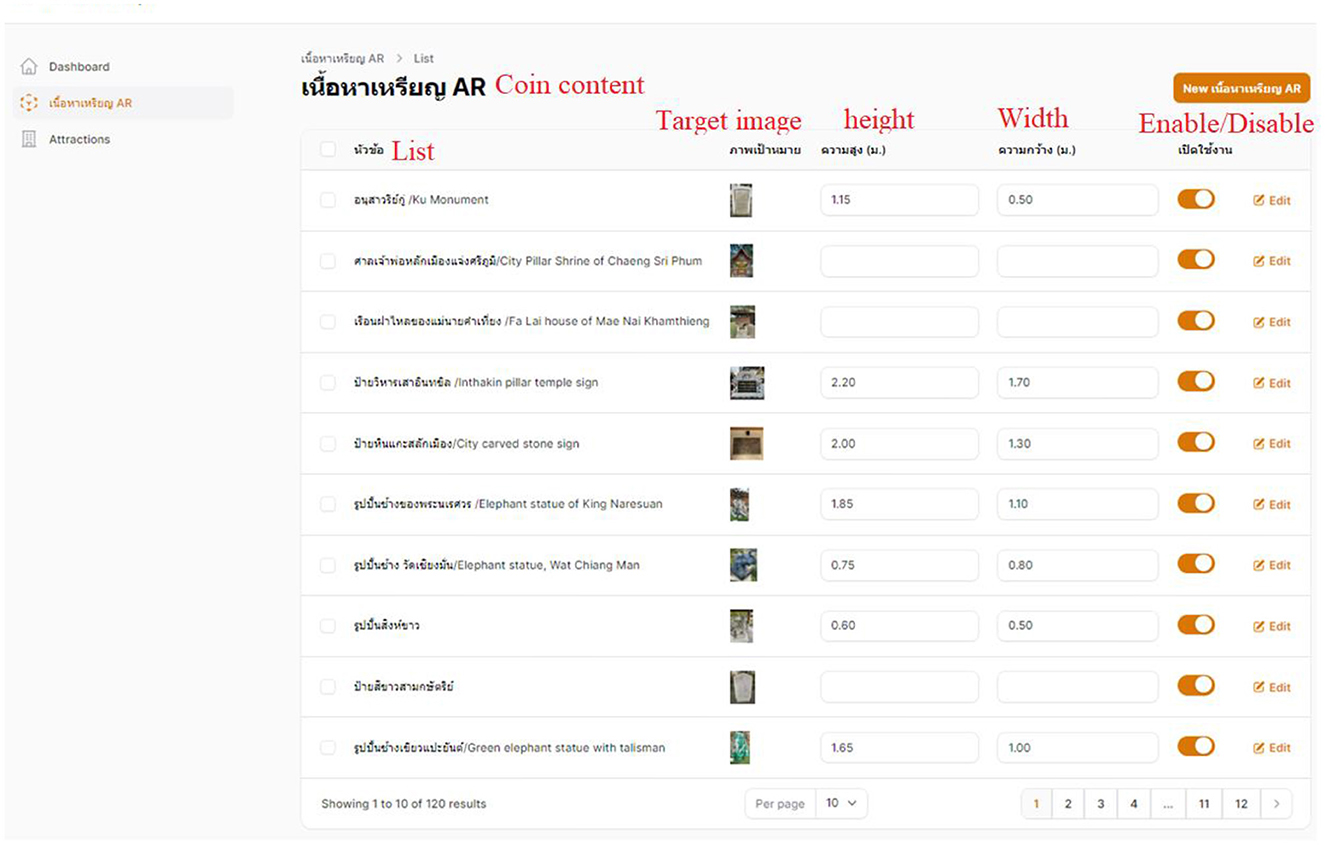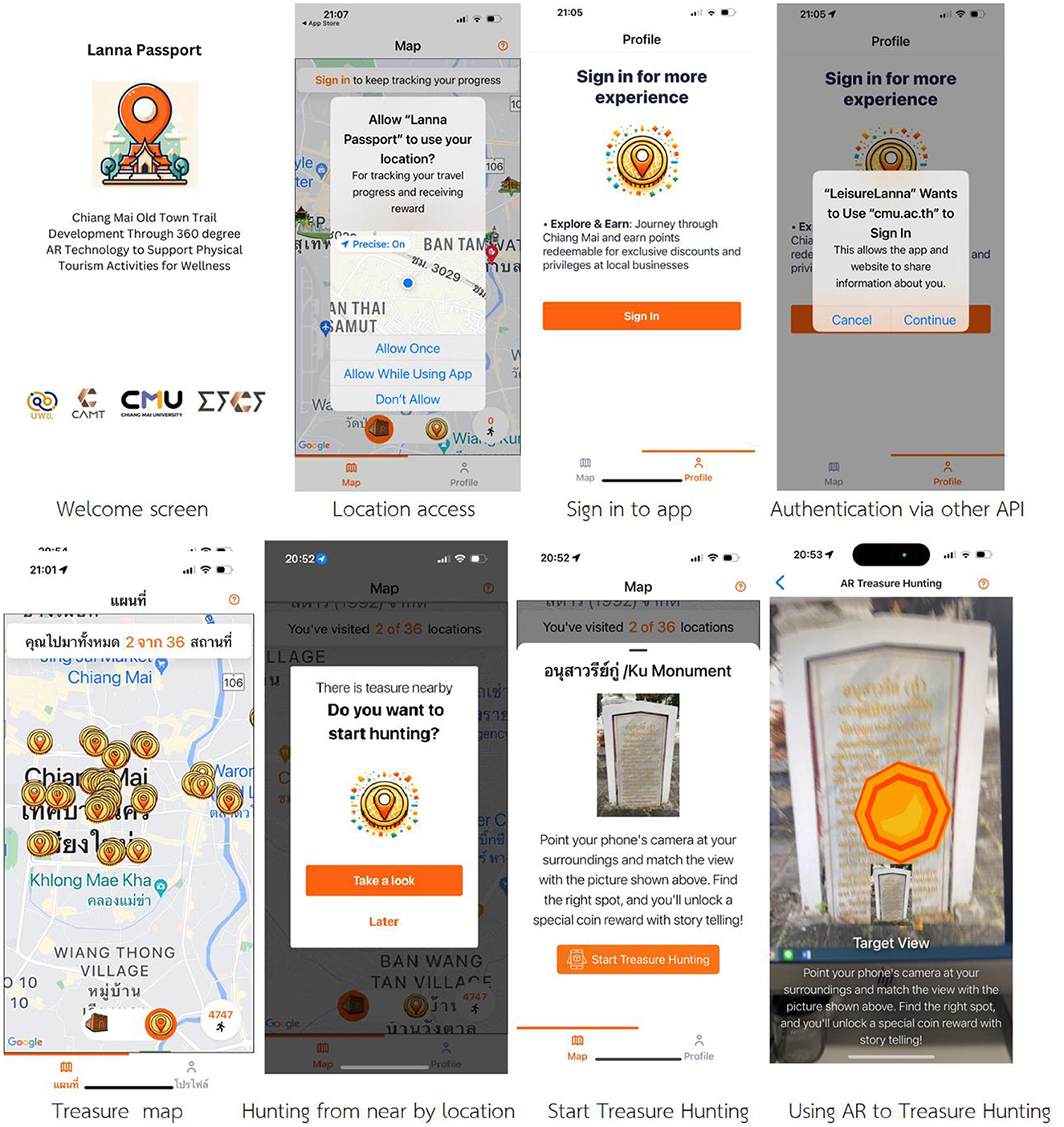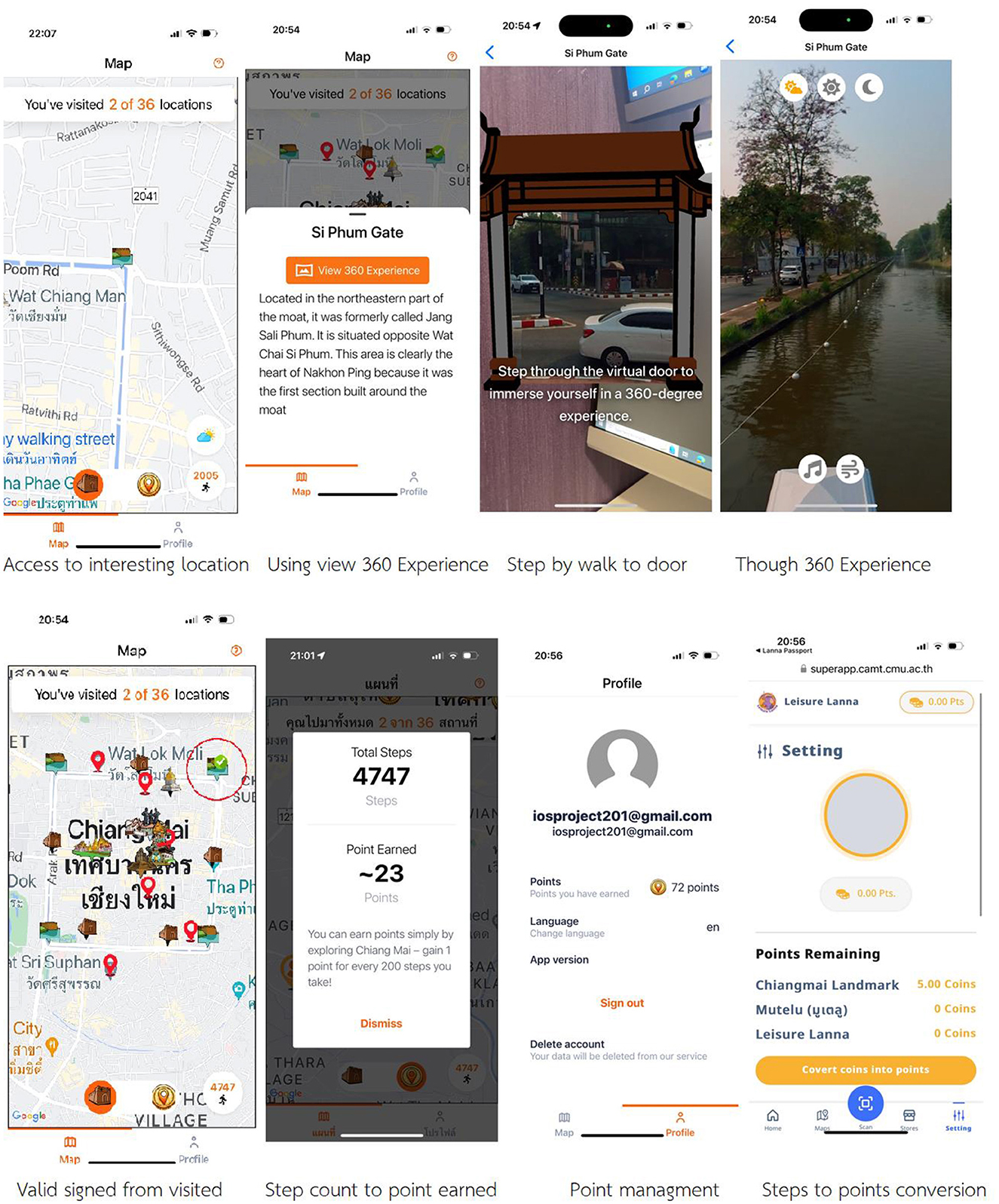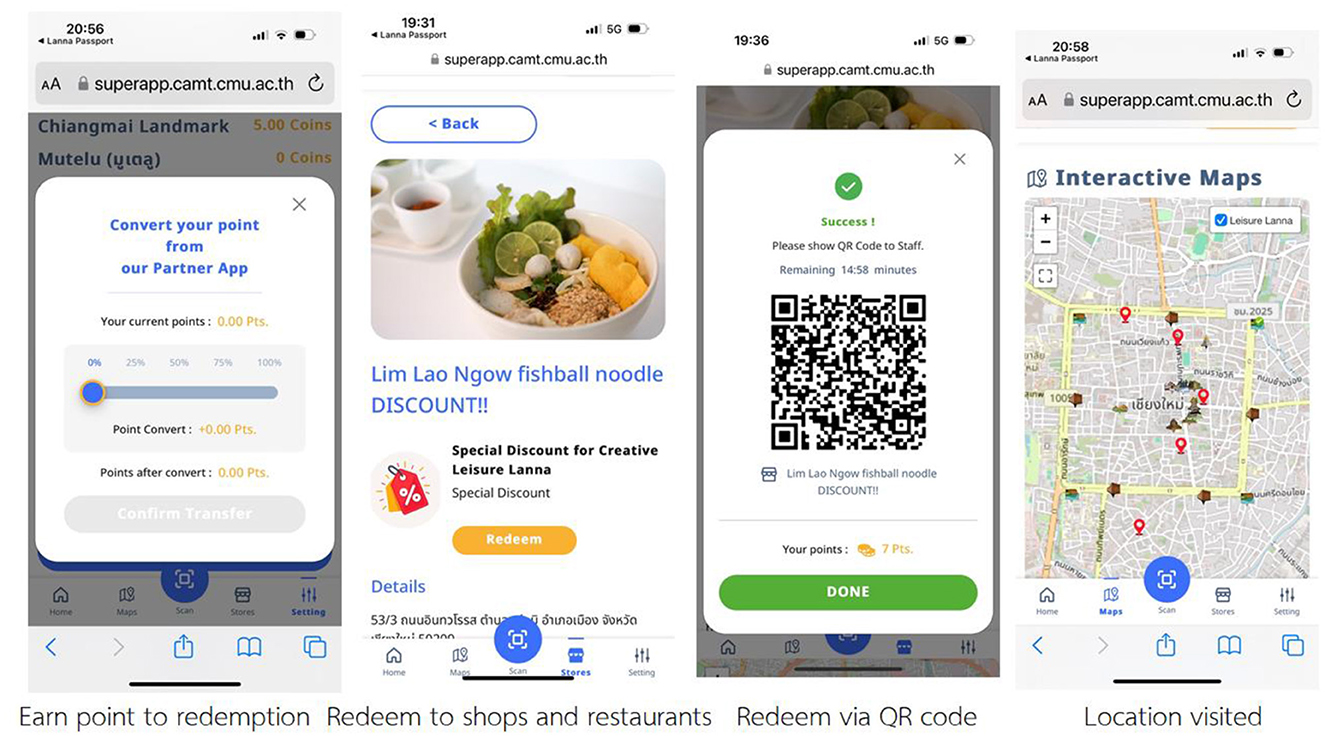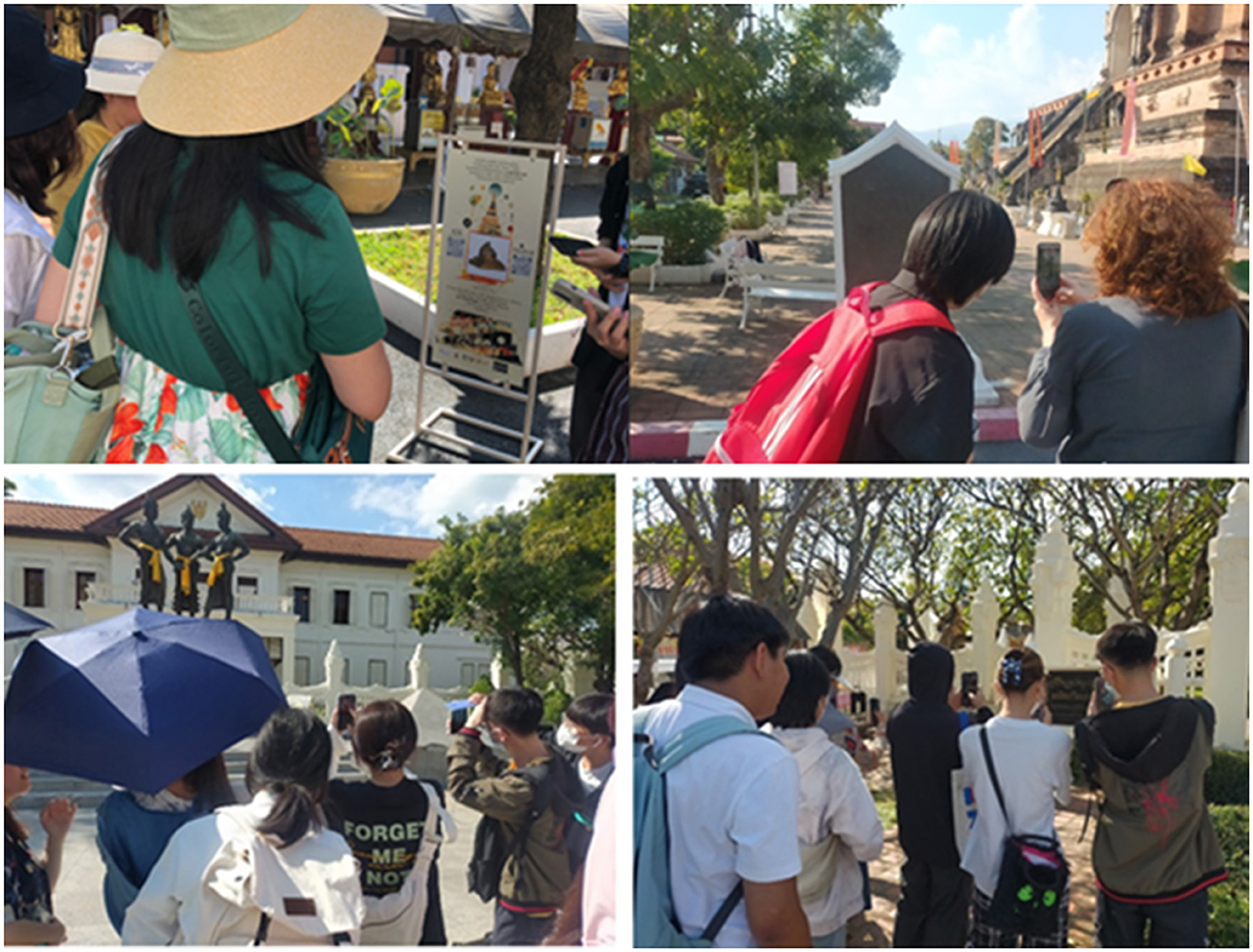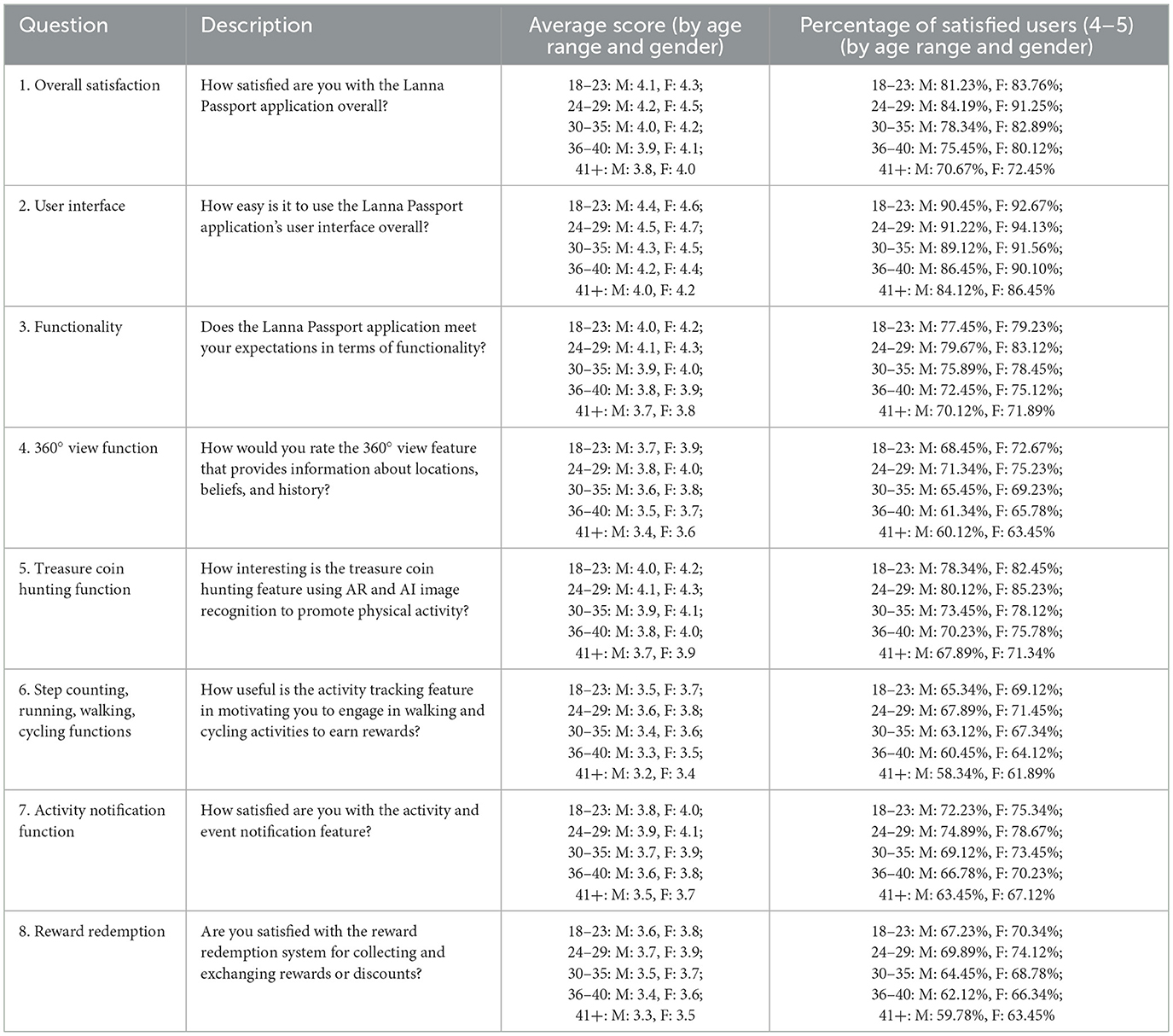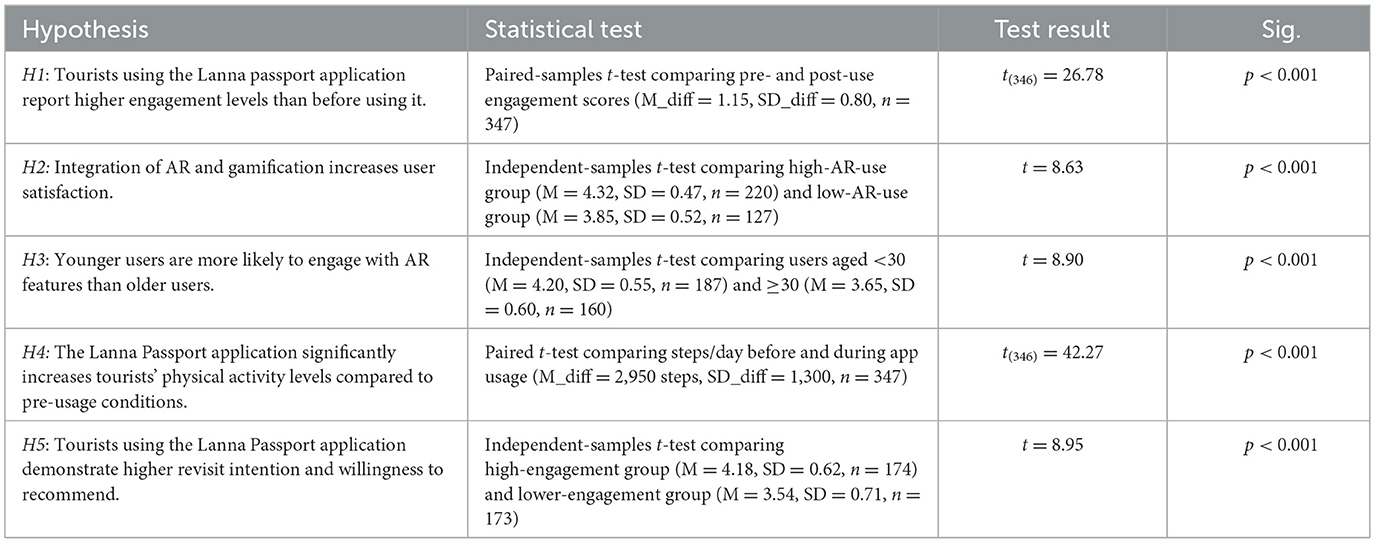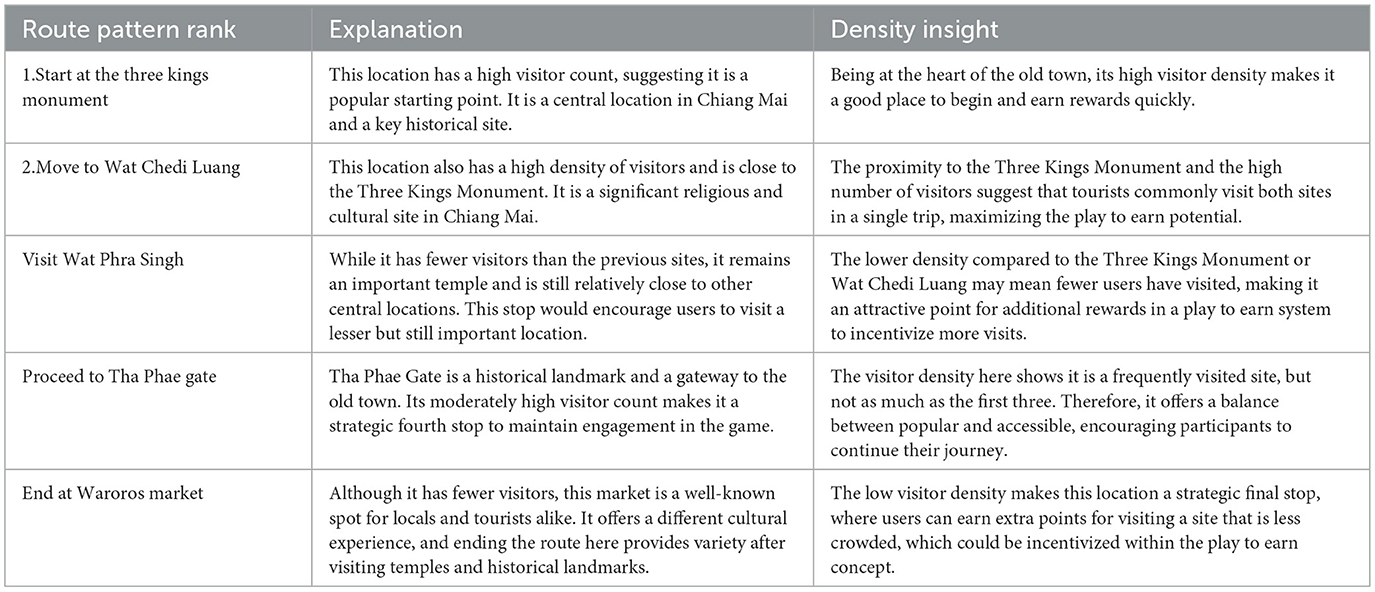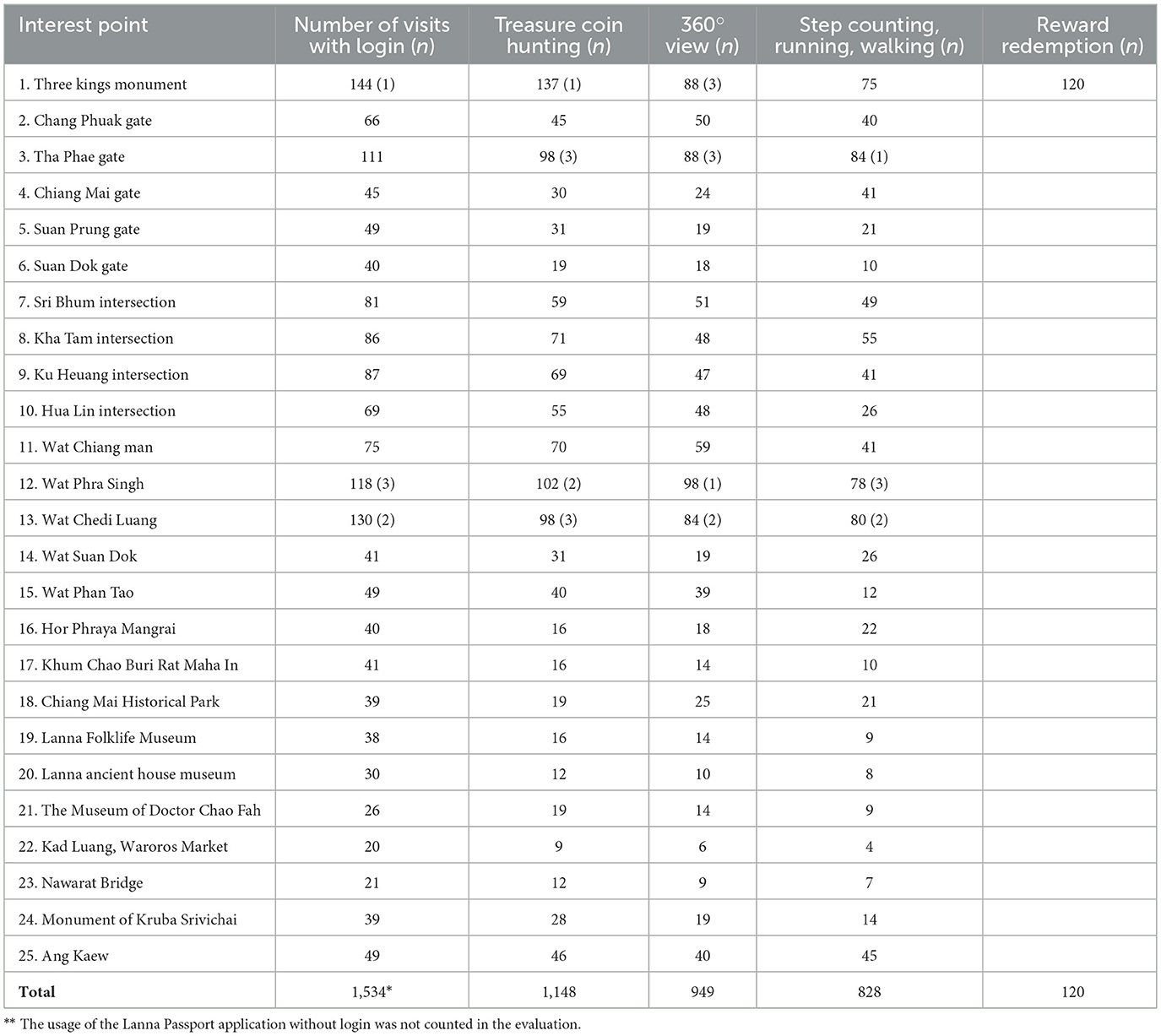- 1College of Arts, Media, and Technology, Chiang Mai University, Chiang Mai, Thailand
- 2Faculty of Mass Communication, Chiang Mai University, Chiang Mai, Thailand
- 3Faculty of Fine Arts, Department of Thai Art, Chiang Mai University, Chiang Mai, Thailand
- 4Faculty of Hospitality and Tourism, Prince of Songkla University, Phuket, Thailand
The integration of digital technologies into tourism has opened innovative pathways to enhance visitor engagement, yet limited research explicitly examines the combined use of gamification and augmented reality (AR) in heritage contexts. This study explores the effectiveness of a “play to earn” approach through the Lanna Passport mobile application designed for Chiang Mai Old Town, Thailand. Utilizing AR, gamified challenges, and reward-based incentives, the app guides visitors through 25 key cultural sites, encouraging physical activity and immersive exploration. Evaluations demonstrate significantly increased engagement and satisfaction, particularly among younger demographics. Nonetheless, usability barriers for older users underscore the importance of designing intuitive interfaces. Results emphasize AR and gamification's potential to promote heritage appreciation and sustainability, offering insights for future application development targeted at diverse tourist groups.
1 Introduction
Leisure tourism, which refers to travel primarily for pleasure, relaxation, and enjoyment rather than business, significantly contributes to personal wellbeing and drives global tourism demand (Pine and Gilmore, 1999). Traditionally, leisure tourism has included activities such as exploring cultural landmarks, relaxing at resorts, or participating in nature-based recreation. However, recent advancements in digital technology have profoundly reshaped tourism experiences, merging traditional leisure activities with interactive digital entertainment (Buhalis and Law, 2008). Among the emerging trends, gamification the incorporation of game elements into non-game contexts has increasingly been integrated into tourism applications to enhance visitor engagement by introducing playful and rewarding components into the travel experience (Pradhan et al., 2023).
Mobile applications have become essential tools in contemporary tourism, significantly changing how tourists plan, navigate, and share their travel experiences. These apps offer functionalities such as itinerary planning, booking, and real-time navigation, reflecting evolving traveler preferences (Dias and Afonso, 2021; Hussein and Ahmed, 2022). The substantial growth in mobile travel app usage from 2022 to 2024 highlights the recovery and expansion of the tourism sector following the COVID-19 pandemic (Ma, 2024). Furthermore, advanced app features like AI-powered recommendations, digital ticketing, and augmented reality (AR) have enhanced convenience, personalization, and overall engagement in tourism experiences (Wu and Wang, 2025; Adjust, 2023).
Within this digital evolution, the “play to earn” model combining gamification with economic incentives has become increasingly popular. This approach motivates tourists to complete interactive tasks and puzzles, rewarding them and thus deepening their engagement with travel destinations (Deterding et al., 2011). These gamified experiences not only make tourism more enjoyable but also support local culture and businesses by promoting curated activities, consequently increasing tourist expenditure (Pradhan et al., 2023).
Thailand, heavily reliant on tourism, has actively explored innovative strategies to revive the industry following the severe disruptions caused by the COVID-19 pandemic. In 2019, Thailand welcomed ~40 million international visitors, generating revenues of around 1.91 trillion baht (Post Reporters, 2024). However, the pandemic drastically reduced tourist arrivals, causing significant economic setbacks. As tourism gradually recovers, Thailand aims to promote responsible, quality-driven tourism experiences aligned with modern traveler expectations. This aligns with national strategies outlined by the Tourism Authority of Thailand (Sorthong et al., 2024; United Nations World Tourism Organization (UNWTO), 2025), emphasizing quality tourism, sustainability, and digital transformation for post-pandemic recovery.
Chiang Mai, an important cultural and historical destination in northern Thailand, continues to face challenges in sustaining tourist interest and encouraging return visits. Despite its rich cultural heritage and historical significance, the region lacks innovative approaches to attract new demographics, particularly younger, digitally-savvy travelers. Similar concerns are current digital storytelling guidelines exhibit significant limitations in applying social-media-specific narrative requirements, a current trend specifically for youth and that heritage destinations face significant engagement challenges, with visitors showing limited motivation to interact with exhibitions (Kasemsarn and Nickpour, 2025).
Although mobile applications have become commonplace in enhancing travel experiences globally, there remains limited research specifically examining how gamification and AR influence cultural appreciation and physical activity within historical tourism contexts.
Addressing this gap, this study investigates how the integration of gamification and augmented reality through the Lanna Passport mobile app influences tourist engagement and satisfaction in Chiang Mai Old Town. The Lanna Passport app offers an immersive tourism experience featuring AR-based storytelling, interactive treasure hunts, and reward-based systems encouraging exploration and physical activity. Specifically, this research seeks to evaluate:
1. To design and develop Lanna mobile application to support sustainable tourism promotion through mobile gamification and reward systems.
2. To assess the effectiveness of gamification and AR in increasing visitor interaction with Chiang Mai's cultural heritage sites.
3. To evaluate user satisfaction and perceived usability of the interactive features and reward mechanisms within the Lanna Passport application.
4. To examine whether gamification significantly motivates tourists to engage in physical activities, such as walking and cycling, while exploring historical landmarks.
5. To explore the impact of AR-based storytelling on visitors' cultural appreciation and their intention to revisit.
2 Literature review and hypothesis development
2.1 Play to earn concept
The following table provides a detailed critical evaluation of key literature supporting the integration of gamification and augmented reality within mobile tourism apps. Each reference is analyzed to highlight its strengths, limitations, and significant contributions, offering a comprehensive synthesis to better understand the effectiveness and practical implications of the play to earn concept.
The critical evaluation from Table 1 reveals significant opportunities for advancing research in gamified mobile tourism applications. Current studies largely focus on theoretical frameworks or specific demographic and geographical contexts, highlighting gaps in empirical evidence, broad generalizability, and integrated exploration of AR and gamification. By empirically examining these combined technologies across diverse demographics particularly assessing differences by age, this research can significantly deepen the understanding of user engagement and satisfaction, thereby contributing valuable insights and practical implications to the broader tourism industry.
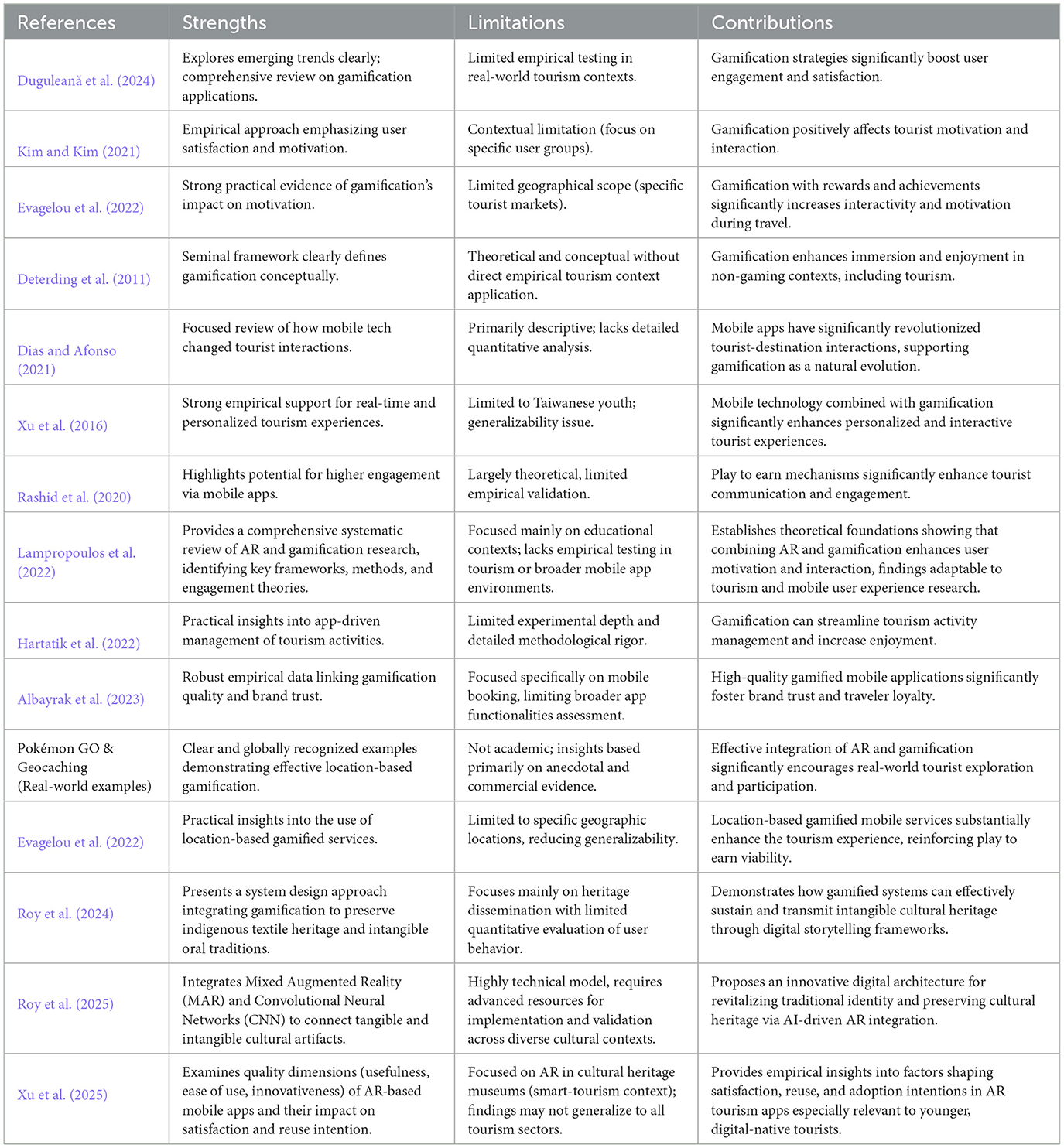
Table 1. Critical evaluation of literature on gamification and augmented reality in mobile tourism applications.
2.2 Augmented reality
AR is an emerging technology that blends real-world environments with virtual elements in real time, offering users a dynamic and interactive experience. Through mobile devices or wearables, AR enables the superimposition of 3D virtual objects incorporating multimedia elements such as color, sound, motion, and lighting onto physical surroundings. This immersive interaction facilitates innovative storytelling and experiential tourism.
AR systems are typically categorized into two main types: marker-based AR and marker-less AR. Marker-based AR uses predefined visual markers, making it ideal for structured settings such as museum tours or heritage sites where users can scan codes for additional content (Tussyadiah et al., 2018; Billinghurst et al., 2015; Cabeleira and Vaz de Carvalho, 2025). Conversely, marker-less AR leverages natural features within the environment, allowing users to explore freely and interact with virtual overlays contextualized in real space such as historical reconstructions over archaeological sites.
The core technologies that enable AR include motion and image detection, voice and sound recognition, and increasingly AI-driven image processing. These technologies enhance responsiveness and personalization by allowing the system to adapt to user movements, recognize speech or beats, and even infer user emotions through visual cues.
Recent studies have critically evaluated the role of AR in mobile tourism which shown in Table 2. Bretos et al. (2023) provide a comparative review of AR and VR technologies, highlighting research trends, although their focus is broader and not exclusively mobile. Allcca-Alarcón et al. (2023) use the PRISMA method to systematically identify factors affecting AR adoption, offering a foundational implementation model. Meanwhile, Özdemir (2021) emphasizes AR's growing role in tourism marketing, although the user experience dimension is underexplored.
Several works have specifically focused on mobile AR applications. Anand et al. (2022) evaluate quality dimensions of smart tourism apps, identifying factors such as satisfaction and reuse intention especially relevant to digitally native users. Similarly, Williams et al. (2020) emphasize user-centered design and show that older users may require additional support during AR app interactions. In contrast, Wood (2023) discusses ethical concerns such as privacy and data security, noting that older users are particularly sensitive to these issues compared to younger users, who prioritize engagement quality.
From a regional lens, Jiman and Kulal (2023) examine the use of AR in Malaysian tourism and its transformative effects, particularly for youth engagement, though responses from older groups are less detailed. Tussyadiah et al. (2018) present a case study in a botanical garden, showing that AR appeals to different age groups in unique ways interactive features for younger users and contemplative features for older ones.
Furthermore, Cao et al. (2021) delve into mobile AR frameworks with a technical focus on interface design and intelligence integration, while Rauschnabel et al. (2019) highlight AR's marketing potential in hospitality, noting gamification increases engagement in Gen Z and Millennials but requires adaptation to appeal to older audiences.
2.3 Theory of soundscape for user engagement in mobile tourism applications
The theory of soundscape in the context of mobile applications explores how urban landscapes and auditory elements enhance user engagement and evoke positive emotions, particularly in tourism. In the Lanna Passport app, soundscapes enhance historical narratives by providing real-time auditory experiences that immerse users in the past. These soundscapes, which incorporate city sounds alongside visuals such as buildings, streets, and public spaces, contribute to a more engaging and emotionally resonant user experience.
When integrated into mobile applications, particularly through 360-degree imagery, Soundscapes enable users to explore and engage with environments as if they were physically present. This immersive experience deepens user interaction, fostering a stronger connection to the location and increasing the likelihood of future visits. Research underscores the importance of visual elements in influencing tourists' decisions and overall satisfaction with virtual experiences (Kang, 2023; Zhang and Huang, 2025). The 360-degree feature enhances this effect by allowing users to navigate freely, providing a comprehensive and interactive exploration beyond traditional photos or videos. This level of engagement helps create a stronger emotional bond with the location, ultimately encouraging a higher interest in visiting (Kou et al., 2023).
Furthermore, the integration of Soundscapes into 360-degree environments enriches the storytelling aspect of the Lanna Passport app, making historical narratives more vivid and memorable. Research suggests that immersive sound enhances user engagement and enjoyment, reinforcing the historical significance of a place through a multisensory experience (Aggag and Kortam, 2025). By leveraging both visual and auditory stimuli, the Lanna Passport app offers a compelling and emotionally impactful way for users to explore and experience historical locations in a revitalized and interactive format.
2.4 Tourist satisfaction and perceived trust in mobile applications
Tourist satisfaction and perceived trust in mobile applications used for tourism are critical factors that influence the overall user experience and decision-making process. Research has shown that satisfaction with mobile tourism applications is strongly linked to the ease of use, functionality, and the quality of information provided by the app (Kim and Park, 2017). When tourists find an application easy to navigate and filled with reliable, up-to-date information, their satisfaction levels increase, which in turn fosters trust in the application (Wu et al., 2022). Trust, in the context of mobile tourism apps, is often derived from the perceived security, privacy, and the app's ability to deliver on its promises, such as accurate location services or timely updates (Zhou, 2012).
Furthermore, the integration of personalized services, such as tailored recommendations and seamless booking options, can significantly enhance perceived trust and user satisfaction (Yum and Kim, 2024). The concept of trust is also intertwined with user engagement, as apps that maintain high levels of security and privacy while providing a personalized, engaging experience are more likely to retain users and encourage repeat use (Morosan and DeFranco, 2016). Overall, the relationship between tourist satisfaction and perceived trust in mobile applications is essential for developers to consider, as these factors not only affect user retention but also influence the app's reputation in the highly competitive tourism industry.
2.5 The Lanna passport application content
In the application the content of Chiang Mai was employed, the cultural capital of Northern Thailand, was founded in 1296 by King Mangrai as the new capital of the Lanna Kingdom, a powerful city-state in Southeast Asia known for its rich cultural heritage and strategic location in the Ping River basin (Wyatt, 1984). The city was strategically built as a center of commerce and religion, protected by its walls and moat, which remain a testament to its historical significance. Among the 25 key points of interest in Chiang Mai's Old Town, the Three Kings Monument stands prominently, honoring King Mangrai and his alliances with neighboring rulers, while Wat Phra Singh and Wat Chedi Luang represent the region's deep-rooted Buddhist traditions. The Tha Phae Gate, once the city's eastern entrance, served as a vital hub for trade and diplomacy. Other notable landmarks include Chiang Mai Gate, Chang Phuak Gate, and Suan Dok Gate, each with unique historical stories tied to the city's defense and development. Additionally, Suan Prung Gate and the Waroros Market showcase the city's evolving cultural and economic identity. These landmarks, alongside religious sites like Wat Suan Dok and Wat Chiang Man, reflect the Lanna Kingdom's historical grandeur and continuing legacy. The Lanna Passport app presents this content in three languages in Thai, English, and Chinese providing an immersive and accessible experience for tourists from diverse backgrounds.
2.6 Theoretical framework and hypotheses development
This section presents the theoretical foundation and logical reasoning that underpin the research hypotheses. Drawing upon prior literature and relevant theories, including the Play to Earn concept, AR in tourism, and Soundscape theory- this study proposes three hypotheses to explore how these technologies influence tourist engagement, satisfaction, and demographic responsiveness.
2.6.1 Gamification and tourist engagement
Gamification, defined as the application of game elements in non-game contexts (Deterding et al., 2011), has become increasingly prominent in digital tourism. The “Play to Earn” approach enhances user motivation by rewarding physical activities such as walking or visiting points of interest (Absolute Reports, 2022; Delic and Delfabbro, 2024). When implemented effectively, gamification fosters deeper emotional and behavioral engagement with tourism experiences.
The Lanna Passport app leverages this model by providing treasure hunts and reward redemption linked to exploration. As tourists interact with these features, their sense of achievement and enjoyment is expected to increase, thereby boosting engagement levels.
H1: Tourists using the Lanna Passport application will report higher engagement levels than those not using it.
2.6.2 Augmented reality and user satisfaction
Augmented Reality (AR) enriches tourism experiences by layering digital content such as 3D visuals, audio, and interactive guides over real-world environments (Billinghurst et al., 2015). In mobile applications, AR facilitates immersive storytelling and enhances user comprehension of cultural heritage (Nikolarakis and Koutsabasis, 2024). Additionally, when paired with intuitive user interfaces and reward systems, AR contributes significantly to perceived usability and trust especially in co-created or gamified AR heritage environments (Yin et al., 2021).
The Lanna Passport application integrates AR in various features, including 360-degree storytelling and AI-driven treasure hunting. These elements aim to improve satisfaction by offering both entertainment and cultural enrichment in a seamless digital experience.
H2: The integration of AR and gamification in tourism apps increases user satisfaction.
2.6.3 Age differences in AR engagement
While AR and gamification can enhance tourism for all users, previous research shows that demographic factors especially age affect technology adoption (Liamruk et al., 2025; Rashid et al., 2020). Younger tourists are generally more receptive to mobile applications and immersive technologies, while older users may prefer simpler, less interactive interfaces.
Given the complex visual and interactive features of the Lanna Passport app, it is expected that younger users will engage more intensively with the AR content.
H3: Younger users are more likely to engage with AR features compared to older users.
2.6.4 Physical activity motivation
The gamified reward system in the Lanna Passport app directly encourages walking, running, and cycling between cultural sites. Prior research (Delic and Delfabbro, 2024) indicates that such reward-driven mobility enhances tourists' physical engagement with the environment.
H4: The use of the Lanna Passport application significantly increases tourists' physical activity levels compared to pre-usage conditions.
2.6.5 Revisit intention
Revisit intention reflects the likelihood that tourists will return to a destination or recommend it after a positive digital experience (Kusumah et al., 2022). AR-enhanced storytelling and reward-based interactions are expected to strengthen such behavioral intentions.
H5: Tourists using the Lanna Passport application demonstrate higher revisit intention and willingness to recommend Chiang Mai Old Town.
2.6.6 Tourist satisfaction and mobile application trust
Tourist satisfaction with mobile tourism apps is largely dependent on ease of use, functional reliability, personalized services, and perceived security (Kim and Park, 2017; Wu et al., 2022). Trust in mobile apps further influences user retention, decision-making, and overall satisfaction (Morosan and DeFranco, 2016). Yet, few empirical studies have simultaneously investigated the integration of gamification, AR, and trust factors in mobile tourism contexts, particularly regarding their collective impact on varying age demographics.
2.6.7 Research gaps and contribution
Considering the existing research, significant gaps remain regarding empirical evidence on how combined AR and gamification approaches impact diverse tourist groups, particularly differentiating user engagement and satisfaction by age. Thus, this study addresses the following critical gaps;
• Empirical analysis of AR and gamification's combined effectiveness in heritage tourism contexts.
• Evaluation of user satisfaction and trust related to interactive mobile applications.
• Age-related differences in engagement and usability perceptions of AR and gamification elements.
3 Materials and methods
3.1 Research scope
This study focuses on assessing the effectiveness of the Lanna Passport mobile application in enhancing tourist engagement and satisfaction through AR and gamification. The app targets 25 culturally significant locations within Chiang Mai Old Town. These locations were selected based on their historical importance, accessibility, and suitability for promoting physical activities such as walking and cycling. The app integrates diverse interactive experiences, including 360-degree panoramic views, treasure hunts, AR-based storytelling, and Soundscapes, aimed at enriching tourists' experiences and promoting local heritage.
3.2 Area of interest
This research focuses on developing a system within the Lanna Passport application to enhance user experiences with tourism in key locations across Chiang Mai City. The system features content that includes 360-degree Photo Scape images taken at different times of the day-morning, afternoon, and night allowing users to see tourist attractions from various perspectives. It also incorporates soundscapes to provide an immersive audio experience that complements the visual content. Each tourist attraction is connected to reference points for walking, running, or cycling activities within the old city area, following the play to earn concept. The research scope includes synthesizing routes and tourist attractions in Chiang Mai's old city, with details summarized in the Table 3 below.
3.3 Study participants and sampling
Participants were recruited using purposive sampling, targeting tourists visiting Chiang Mai Old Town between January and June 2024. Recruitment channels included travel forums, social media advertisements, and partnerships with local tourism agencies. Participants were informed clearly about the study's objectives and provided consent before participation, complying with ethical standards approved by the Chiang Mai University Research Ethics Committee (CMUREC).
The demographic composition of participants (n = 347) was diverse, covering a wide range of age groups, nationalities, and familiarity with mobile applications. Detailed demographic data were collected, including gender, age, nationality, and mobile operating system preferences (iOS or Android), to enable a thorough analysis of user preferences and interactions.
3.4 Research design and procedures
The research employed a mixed-method approach combining quantitative and qualitative data collection methods to comprehensively evaluate the app's effectiveness.
3.4.1 Quantitative methods included
Structured surveys, A questionnaire using a 5-point Likert scale was employed to measure user satisfaction, perceived usability, trust, and engagement across various application features.
Survey items were adapted from established scales measuring mobile app satisfaction and usability, including the Mobile App Usability Scale (MAUS; Zhou, 2012) and Tourist Experience Engagement Scale (Kim and Park, 2017). Each construct (satisfaction, usability, trust, engagement) was measured using 4–6 Likert items with Cronbach's α values above 0.80, indicating acceptable reliability.
App analytics, User interactions within the app were tracked, including feature usage frequency, time spent engaging with AR and gamification activities, and physical activity levels measured by integrated step-counting technology.
Statistical Analysis, To determine significant differences across variables, paired-samples and independent-samples t-tests were employed, focusing on satisfaction, age group variations, engagement scores before and after use, high-AR-use groups, daily step counts before and during app utilization, and levels of engagement among high-engagement users.
Noted: Although all 347 participants used the Lanna Passport app, Hypothesis H1 (“Tourists using the Lanna Passport application will report higher engagement levels than those not using it”) was assessed through a pre–post within-subject design. Participants completed baseline questions on engagement intention before using the app and a post-usage survey after exploration. The comparison of mean engagement scores before and after usage validated the hypothesis. This approach aligns with similar mobile tourism experiments (Kim and Park, 2017).
3.4.2 Qualitative methods included
Interviews and User Feedback, Semi-structured interviews and open-ended surveys captured qualitative insights into user experiences, particularly regarding AR storytelling effectiveness and cultural appreciation.
Thematic Analysis, Qualitative data were analyzed using thematic analysis methods. Key themes emerging from the qualitative feedback were visually represented using a word cloud, providing insights into user perceptions and areas for improvement.
3.5 Application development and implementation
The Lanna Passport mobile application was developed using Flutter to ensure cross-platform compatibility (iOS and Android). The app integrated AR elements, gamification mechanics, and Soundscape experiences designed specifically for enhancing tourism within Chiang Mai Old Town.
Key Functionalities:
1. 360-degree Immersive Views, each of the 25 selected landmarks was captured through panoramic images at different times of the day (morning, noon, evening).
2. Soundscape Integration, Audio elements, such as ambient sounds and historical narrations, enhanced the immersive nature of the app.
3. Treasure Hunting and AR-based Interactions, Gamified treasure hunting encouraged exploration, rewarding participants for finding virtual treasures and completing location-based challenges.
4. Physical Activity Incentives, Integrated step-counting encouraged tourists to walk, cycle, or run between landmarks, rewarding them with points redeemable at local businesses.
3.6 Data collection procedure
Data collection proceeded in several stages;
Initial Data Collection and Route Planning, Historical and cultural information about landmarks were collected and integrated into the app. Routes connecting landmarks were developed to encourage physical activity.
System Design and Data Processing, Multimedia content (360-degree images, Soundscapes, and AR interactions) were produced and embedded into the app. Backend systems managed real-time updates and activity tracking.
Pilot Testing and Feedback, an initial version was tested by a group of international tourists. User feedback identified performance and usability issues, prompting refinements such as optimized image processing, improved app responsiveness, and simplified navigation.
Final Implementation and Public Launch, the refined app was deployed via Google Play and Apple's App Store, promoted with physical signage strategically placed at key tourist locations to facilitate ease of access and enhance user adoption.
3.7 Data analysis
Quantitative data were analyzed using descriptive statistics to summarize satisfaction levels and engagement metrics. Inferential statistical analyses explored significant differences in user engagement and satisfaction based on demographic variables.
Qualitative data were analyzed thematically, identifying recurring themes in user feedback regarding AR storytelling effectiveness, cultural appreciation, and usability. These themes were visually summarized using word clouds and sentiment categorization (positive, neutral, negative).
4 Results
4.1 User demographics
The final sample comprised 347 participants as show in Table 4, diversified by age, gender, nationality, and preferred mobile operating system. Participants aged 24–29 represented the largest group (28.74%), followed by those aged 18–23 (25%). Gender distribution was relatively balanced, with females (58%) slightly outnumbering males (42%). Notably, participants from China (20.98%) and Korea (18.10%) formed the largest national groups, with other notable countries including the USA, the UK, and Thailand. Android (~60%) was the most frequently used mobile operating system across nationalities, though a significant portion of users preferred iOS.
4.2 Overall user satisfaction and engagement
Survey results in Table 5 indicated high overall satisfaction with the Lanna Passport application, particularly among younger users. Respondents in the 18–23 age group showed the highest average satisfaction scores (males: 4.1, females: 4.3 on a 5-point scale), while users over 41 demonstrated slightly lower satisfaction (males: 3.8, females: 4.0). Overall, about 84% of younger participants (ages 18–29) expressed high satisfaction (rating 4–5), indicating that the gamified AR approach resonated particularly well with this demographic.
4.3 Results of data collection and route planning
The survey of locations within the Chiang Mai Old City area was conducted to support physical tourism activities, such as walking, cycling, and running. The chosen locations were selected based on their suitability for promoting these activities, ensuring they had appropriate walking distances and highlighted key aspects of Lanna culture. The selected sites are important cultural landmarks and educational resources in Chiang Mai, showcasing the rich heritage of the region. The selected locations, as shown in Figure 1 and corresponding to the points in the Table 6, include;
Whereas, photographs were taken at different times of the day-morning, afternoon, and evening to create 360-degree images. Audio recordings were also captured to match the ambient sounds with the visuals at each location, enhancing the immersive experience. The example of 360-degree photographs was shown in the Figure 1.
4.4 System design and spatial data collection
The data collected in the previous phase was analyzed to create content for the tourist attractions, as illustrated in Figure 2, which highlights the target points of interest selected for 360-degree image recording and soundscapes. These elements were designed to enhance the AR experience by offering multiple perspectives of each location at different times of the day: morning, noon, and evening. Additionally, music reflecting local identities including folk, Lanna, and live music from local musicians was incorporated with authorization from the copyright owner. All of these materials were processed and integrated into a system aimed at enhancing the tourist experience.
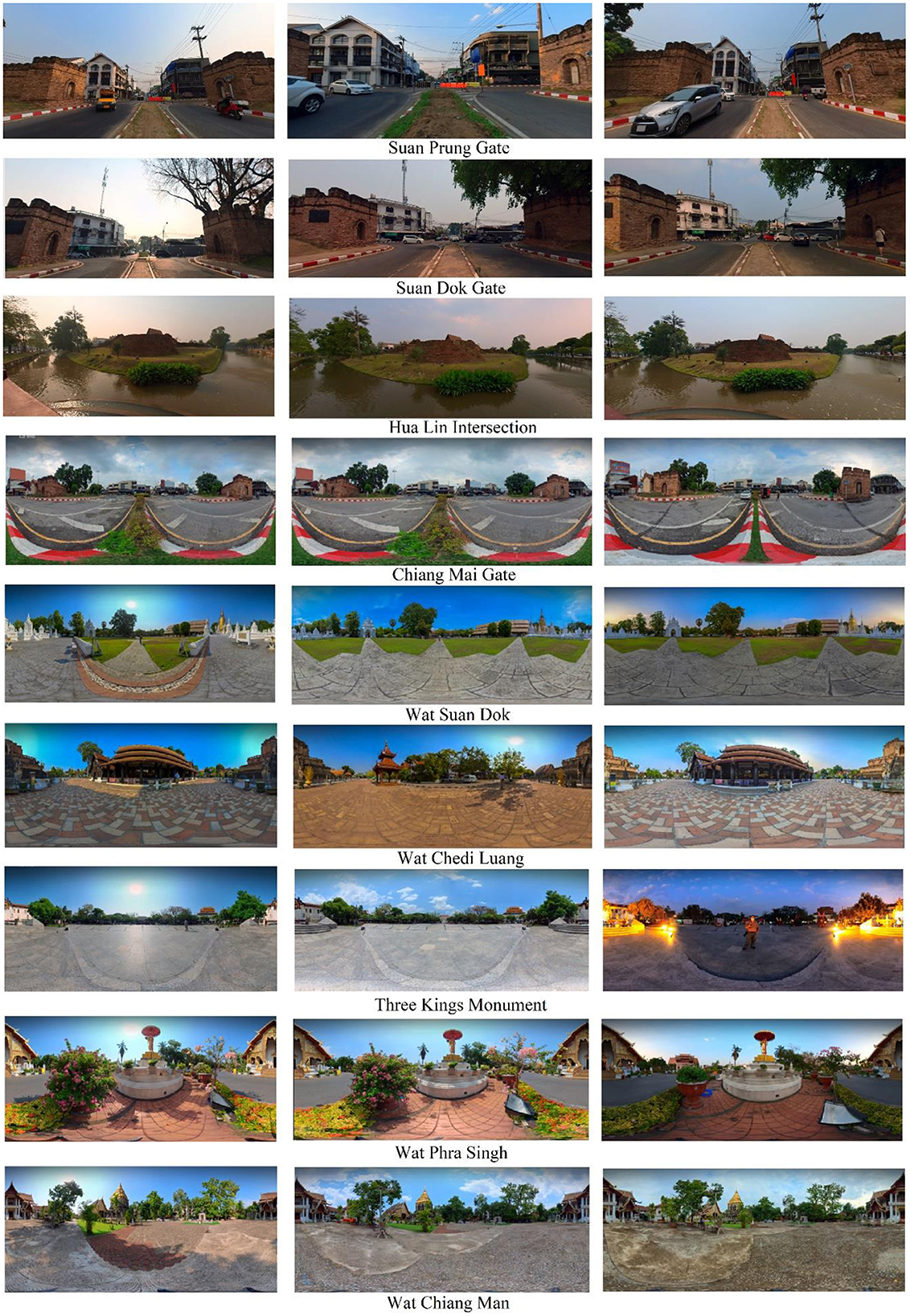
Figure 2. Example 360-degree photographs were taken from the target points at different times of the day (three times per point).
4.5 Route and Gamification design
The result in this step, we developed a tourism experience that combines a route through the old city of Chiang Mai with interactive activities, immersive visual experiences, and Gamification elements. The primary goal is to create excitement and offer a fresh, engaging way to explore the city's rich cultural heritage. The AR-based Gamification strategy involves collecting treasure coins from 25 designated areas, each linked to significant landmarks and points of interest. The physical map is displayed in Figure 3, highlighting nine example points that represent key locations for AR-enabled treasure hunts. These points serve as hubs for linking various tourist attractions and displaying related to the map in Figure 1.
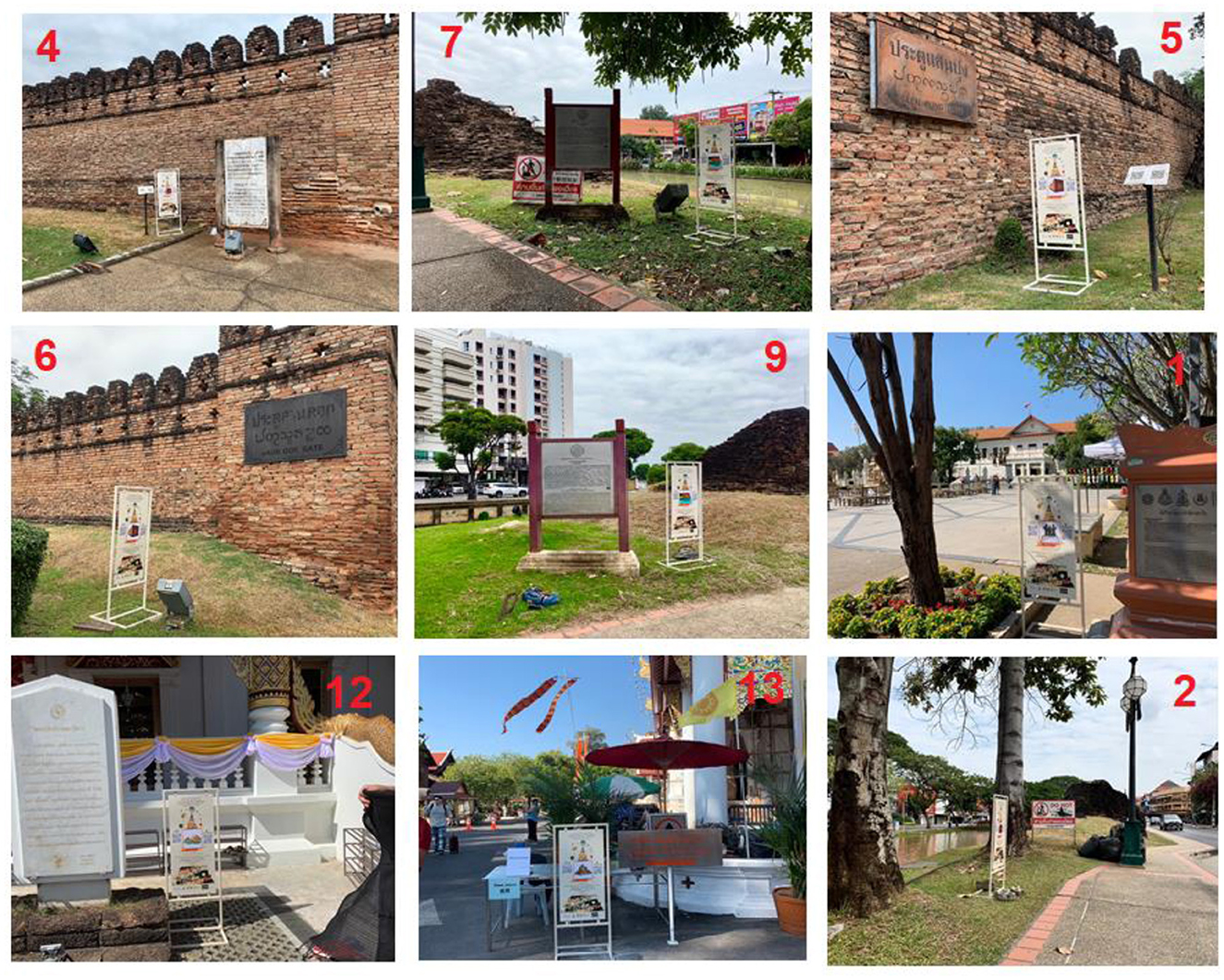
Figure 3. The physical map is displayed highlighting nine example points that represent key locations from 25 points.
4.5.1 Gamification strategy to engage users strategic
Scenario, as users navigate the Chiang Mai Old City Trail, they are encouraged to explore nearby locations by walking, running, or cycling. The route strategically links historical sites, cultural landmarks, and iconic spots through a series of interactive challenges. At each point on the map, users are prompted to search for additional point or treasure coins. When a user successfully finds a hidden item, the application triggers an AR popup displaying the found item along with a gold coin reward. This reward system not only incentivizes exploration but also adds an element of adventure to the experience.
4.5.2 Linking points on the map
Eeach point on the map is designed to lead users naturally to the next location. For example, after visiting the Three Kings Monument, users might be guided toward the nearby Chang Phuak Gate through a series of clues or visual markers. The transition between points is facilitated by encouraging users to engage in physical activities like walking or cycling. These activities are reinforced by the promise of discovering more hidden treasures, which keeps users motivated to continue along the route.
4.5.3 Route strategy
The route is strategically planned to maximize user engagement by ensuring that each location offers a unique experience. For instance, the path from Wat Phra Singh to Wat Chedi Luang might involve a challenge related to Lanna architecture, while the journey from Tha Phae Gate to Chiang Mai Gate could include a historical additional point and the number of medals and points increased more than usual. These varied activities ensure that users remain engaged throughout the entire trail.
4.5.4 Gamification mechanism
The treasure coin mechanism is a gamification strategy designed to engage users as they explore different locations in Chiang Mai Old City. This mechanism motivates users to move from one location to another, enhancing their experience through interactive and rewarding elements, the mechanism of treasure coin and user motivation and progression are show in logic flow 1–2;
Logic flow 1: Treasure coin mechanism.
Treasure coin mechanism
For each place Pi ∈ NearbyPlaces[] Pi
If the user reaches Pi, trigger the AR mechanism to reveal the treasure coin
If Pi∈ EventPlaces[], add additional coins to the reward
If Pi∈ AdditionalPoints[], provide the standard reward
If d (A,Pi)>d (A,Pj) (where Pj is closer), increase the number of prominent rewards
Logic flow 2: Treasure coin mechanism.
User Motivation and Progression Mechanism
If a treasure coin is found at Pi
Encourage the user to walk to the nearest place Pj (where d (A,Pj)<d (A,Pi))
Display a message or incentive to visit the next closest point or event place
If the user arrives at Pi∈ EventPlaces[]:
Trigger the event activity at Pi and offer more additional coins
The Treasure Coin Mechanism is designed to motivate users to explore various locations (Pi) within a designated area by using augmented reality (AR) to reveal virtual treasure coins when they arrive at these places. If the user reaches a specific event location (EventPlaces[]), they receive additional coins as a reward, while standard locations (AdditionalPoints[]) provide the regular amount of treasure. To incentivize further exploration, the mechanism increases the reward for locations that are farther from the user's current position (d (A, Pi) > d (A, Pj)). The User Motivation and Progression Mechanism complements this by encouraging users to move to the nearest unexplored location (Pj) after collecting a coin, offering incentives or prompts to continue their journey. If the user arrives at an event location, the system triggers an additional activity and provides bonus rewards to sustain engagement and participation in the gamified experience.
4.6 System development
The result of development of the system focus on enhancing tourism in the old city area using AR technology. This system has been developed as an application for smartphones, compatible with both iOS and Android operating systems, using the Flutter tool. The system also supports the Composer tool, allowing the integration of various plugins to design and develop user interfaces and functionalities. Additionally, a back-end system linked to the application has been developed to ensure that the content remains up-to-date, with the flexibility to adjust, add, or remove key locations or activities in the target area as needed.
4.6.1 Content and location management
The back-end system supports editing existing locations and adding new points on the map, as shown in Figure 4. It offers flexibility in data management and allows for urgent data updates. Through the API, changes made in the back-end can be immediately reflected on the user's device, making it easy to add new points or make necessary edits in real-time. This feature is particularly useful for managing important tourist spots and adding new activities or points of interest as they arise.
4.6.2 Multimedia integration
The system allows for the easy addition of multimedia content, including 360-degree images, sound, narration, and music, as shown in Figure 5. This capability simplifies the process of updating content quickly, which is essential for keeping the application relevant and engaging.
4.6.3 Treasure hunting and AI integration
The back-end system enables the addition of treasure-hunting points and the configuration of settings related to AI image recognition, as shown in Figure 6. This feature enhances the interactive experience for users, making the exploration of the old city more engaging. Such customization back-end system allows for increasing or decreasing the amount of content presented, as well as making adjustments or adding additional content when needed.
4.6.4 User and location management
The system supports the processing of user interactions and provides access to tourist attractions, as shown in Figure 7. It allows for the strategic organization of content and locations based on the density of tourists and their activities. This feature ensures that the application can be adapted to support tourism strategies and activities within the old city, helping to manage tourist flow and enhance the overall experience.
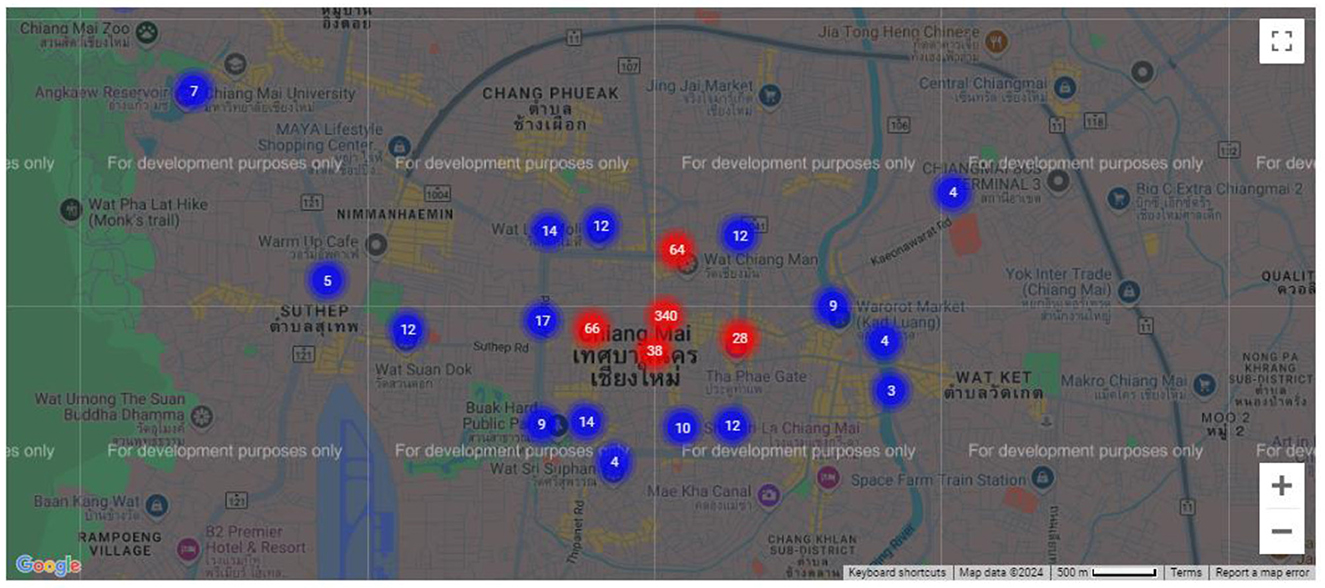
Figure 7. User and location management show as a density map of travel visits, and concentration of user activity at various tourist sites. Map data ©2024 Google.
4.6.5 Lanna passport application
The application result as show in Figure 8, The system will ask for permission to access your location to meet the security standards of your phone's operating system. On the login page, users can connect through their Google account or sign up using their iOS account on their smartphone. The app features a treasure hunt where users can search for treasure coins at various locations in the target area. The system will automatically pick the location closest to the user, based on their current location settings. Players need to physically travel to the real location and search for the treasure. Once they arrive, they can select “Take a look” to open the Treasure Hunting page, which will allow them to scan the area and collect the treasure coin.
Users find the object and scan it using the app, which matches the object with a watermark image. The system uses AI Image Recognition to analyze the object, and once a match is found, it plays a voice that tells the secret or meaning of the object in the selected language Thai, English, or Chinese.
In addition, in Figure 9, users can also choose the normal mode if they want a 360-degree view of the location. The map will highlight places they've already visited (green check mark) and places they haven't visited yet. Points of interest (red) will show important locations with interesting stories nearby. When selects 360-degree view mode, they pick a location, and the system displays an option to “View 360 Experience.” The user must walk through the marked area to enter the target location. Once they arrive, a 360-degree view of the real location will appear. Users can explore this virtual view in three different times of the day: daytime, noon, and evening, providing unique experiences of the same place at each time.
As users travel to different places, the map will show a check mark (in a red frame) for each visited location. Walking activities (steps) will only be counted within the target area and can be converted into points to be used for discounts at local services, restaurants, or cafes. For every 200 steps, users will earn 1 point.
Users can convert points from physical activities like walking, cycling, or running by selecting the “Points” option from the menu. The system will link with their main account to track their points. Users can then select “Convert Points” to exchange coins for points.
The application tracks steps, awarding 1 point for every 200 steps. Users also earn 10 points for visiting a location. Once they accumulate enough points, they can choose a participating store or service to redeem their points for coupons. The system will generate a QR code, which users can scan to redeem discounts. After redeeming, the system will process the request and show a QR code for the store to scan as show in Figure 10.
4.7 Testing and refinement
In the system trial conducted with a sample group of foreign tourists interested in Chiang Mai's history, the play-to-earn mechanism was implemented, as illustrated in Figure 11. After downloading and explaining the basic usage, users were allowed to explore the app, and we gathered feedback on their experience. In version 1 of the prototype, we found issues with the 360-degree image processing and image recognition for collecting treasure coins. These problems were related to the heavy resource usage on users' devices, particularly battery consumption and overheating. As a result, we identified the need to improve the algorithm to optimize performance and reduce the strain on devices.
Additionally, we noticed that the display interface did not work smoothly. Users experienced slow response times when touching and selecting points on the map, leading to frustration and feelings that the system was unresponsive. This issue was recorded for improvement in the next version, with a focus on enhancing response efficiency, a critical factor for user satisfaction. Lastly, feedback from Chinese tourists revealed that some smartphones bought in China blocked certain services, leading to inefficiencies like slow camera activation or extended processing times compared to devices bought in Thailand.
4.8 Implementation and evaluation
4.8.1 User satisfaction thought Lanna passport application
The evaluation results of the Lanna Passport application provide interesting insights into user satisfaction across different age groups and genders, based on data collected from March to May 2024 as shown in Table 7. In terms of overall satisfaction, younger users in the age range of 18–23 appear to be more satisfied, with males averaging a score of 4.1 and females slightly higher at 4.3. This trend is consistent across all age groups, where females generally rate their satisfaction higher than their male counterparts. The highest satisfaction is seen among females aged 24–29 (4.5), while the lowest scores come from males over 41 (3.8).
The percentage of satisfied users, those rating 4–5, follows a similar pattern, with higher percentages in the younger age groups and a gradual decline as age increases. The trend is particularly noticeable in the older group (41+), where male satisfaction drops to 70.67% and female satisfaction to 72.45%.
For the user interface, both males and females gave high scores, with younger users rating the feature more positively. Males aged 18–23 gave an average score of 4.4, while females rated it 4.6. The satisfaction scores remained strong across all age groups, with the highest scores being from users aged 24–29, where females gave it a 4.7 and males 4.5. The overall trend shows that the user interface is one of the most highly-rated features, especially by younger users, while satisfaction declines slightly in the older age groups.
When assessing the application's functionality, the scores drop slightly compared to other categories. Males aged 18–23 rated the functionality at 4.0, and females gave it a 4.2. Again, the pattern of females rating the application higher than males continues across all age groups. Satisfaction with functionality decreases as users get older, with the lowest scores coming from males aged 41+ (3.7) and females of the same age group (3.8).
The 360-degree view function was rated lower than other features, with males in the 18–23 age range giving it a score of 3.7, while females rated it at 3.9. The feature shows declining satisfaction with increasing age, with males over 41 rating it at 3.4 and females at 3.6. This feature appears to need improvement, especially in terms of its appeal to older users, as satisfaction decreases significantly in the older age groups.
The treasure coin hunting function, which uses AR and AI image recognition, garnered relatively high scores, particularly from younger users. Males aged 18–23 rated this feature at 4.0, and females at 4.2. However, satisfaction again decreases with age, with males aged 41+ giving it a 3.7 and females a 3.9. The functionality and engagement of this feature seem to resonate more with younger audiences, but its effectiveness could be improved for older users.
While younger participants reported high satisfaction, engagement among older users (41+) was lower, particularly in the 360° and AR functions. This suggests the need for adaptive interface design including simplified menus, larger font sizes, and guided tutorials to accommodate varying levels of digital literacy.
Regarding the step-counting, running, walking, and cycling functions, younger users rated this feature higher, with males aged 18–23 giving it a 3.5 and females a 3.7. The lowest satisfaction comes from males aged 41+ (3.2) and females of the same age (3.4). This trend suggests that this feature may be less useful or appealing to older users and may need adjustments to enhance its value across all age groups.
Finally, the activity notification and reward redemption features both follow a similar trend, with younger users showing higher satisfaction levels. However, these features do not score as highly as others. For the activity notifications, males aged 18–23 rated it at 3.8, and females rated it at 4.0. For reward redemption, satisfaction rates drop further, with males aged 18–23 rating it at 3.6 and females at 3.8. Satisfaction declines with age, particularly in the 41+ group, where males rated the reward system at 3.3 and females at 3.5.
Thus, the Lanna Passport application is more favored by Younger users (18–29) reported the highest engagement levels, with 84% rating satisfaction as 4 or 5 stars, while users over 41 showed a drop-in engagement to 70%, especially with the more interactive and physically demanding functions, such as the 360-degree view and activity tracking. To improve user satisfaction across all age groups, the developers could focus on optimizing the app's more interactive features for older users and ensuring that the content and functionality are relevant and easy to use for all demographics.
Younger females consistently reported higher satisfaction than other demographic groups across all features, particularly regarding usability and interactive components.
4.8.2 Statistical analysis
Table 8 presents the inferential statistical analyses conducted to test the five proposed hypotheses (H1-H5) regarding user engagement, satisfaction, age differences, physical activity, and revisit intention associated with the Lanna Passport application. Each hypothesis was examined using t-tests appropriate to the data type paired-samples t-tests for within-group comparisons (pre- and post-usage) and independent-samples t-tests for between-group comparisons (e.g., high vs. low AR usage, younger vs. older users). The simulated dataset was generated to align with the descriptive findings in the study and to reflect realistic behavioral patterns observed among tourists in Chiang Mai's Old Town. The statistical results confirm that the integration of AR and gamification elements significantly enhances user experience, increases physical activity levels, and fosters stronger behavioral intentions toward revisiting and recommending the destination.
4.8.3 Qualitative feedback from user
The word cloud in Figure 12 was generated using NVivo software to visualize term frequency and sentiment polarity from participants' open-ended feedback. Words appearing larger indicate higher frequency of occurrence, providing an at-a-glance summary of dominant user perceptions. The word cloud performed from interviews and online feedback from 78 participants (from 347), highlights the key themes emerging from user experiences with AR-based storytelling in the Lanna Passport mobile application. Words are color-coded by sentiment: green indicates positive feedback (e.g., immersive, engaging, educational), yellow represents neutral responses (e.g., accurate, smooth, realistic), and red signifies usability challenges (e.g., confusing, frustrating, unresponsive). The size of each word corresponds to its frequency in participant feedback, with terms like immersive, historical, and engaging appearing most frequently. The dominance of green words suggests a generally favorable perception of the application, with many users viewing the AR experience as beneficial for cultural appreciation and engagement. However, the presence of red words underscores technical and design limitations, particularly affecting older or less tech-savvy users. This blend of perspectives reflects both the effectiveness of AR storytelling and the need for interface design and system performance improvements to ensure a more seamless user experience. Additionally, the accompanying chart further confirms that positive sentiment outweighs negative sentiment in both quantity and frequency, reinforcing the overall favorable reception of the application.
4.8.4 User visitation patterns and route preferences
To establish an optimal travel pattern using the play to earn concept, locations are prioritized based on visitor density, reflecting their popularity and frequency of visits. This approach encourages users to explore high-traffic sites, collect rewards, and engage in key activities. The data, collected from the back-end system, identifies the most frequently traveled routes among visitors. By analyzing repeated travel patterns accounting for more than 80% of observed movements a representative route is selected to illustrate user behavior. Table 9 provide critical insights into how tourists interact with the play-and-earn system in Chiang Mai, based on data gathered from March to May 2024.
High-visit interest points such as the Three Kings Monument, with 144 visits and 137 participants in Treasure Coin Hunting, and Wat Chedi Luang, with 130 visits, are central locations that align with the suggested route pattern in Table 10. These sites, being historically significant and densely populated, serve as popular starting points and maximize engagement with game features like Treasure Coin Hunting, 360° views, and reward redemption.
Conversely, the lower engagement at Waroros Market may be due to its function as a shopping destination rather than a historical site, suggesting a need for additional gamification incentives in non-historical locations.
Interestingly, despite its lower density, Wat Phra Singh attracts notable engagement with 118 visits and high usage across all features, indicating its importance in the visitor journey. The pattern of moving from densely visited sites, such as the Three Kings Monument and Wat Chedi Luang, to moderately popular locations like Tha Phae Gate (111 visits), maintains user interest. Lesser-visited sites such as Waroros Market, Kad Luang, and the Lanna Ancient House Museum (with fewer than 50 visits each), highlight the need to incentivize participation by offering more rewards at these points. These insights help optimize both the route and user engagement strategies in the app's design.
4.8.5 Challenges and application improvements
Pilot testing identified critical areas needing improvement, particularly regarding resource efficiency and ease of use. Users reported issues such as battery drain, device overheating, slow response times, and complicated AR interactions, leading to frustration, especially among older demographics. Additionally, Chinese users reported compatibility issues related to smartphone restrictions on services available within China.
Furthermore, some functionality issues reported by Chinese participants stemmed from device-level service restrictions and limited compatibility with Google-based APIs in certain domestic smartphones. To address this, a region-specific deployment strategy is planned, using alternative cloud services and SDKs compatible with Chinese Android distributions (e.g., Huawei HMS Core) to improve accessibility and stability.
Lastly, technical performance issues identified during the pilot such as high battery consumption, overheating, and delayed responsiveness were primarily linked to real-time AR rendering and 360° panoramic processing. Optimization will focus on algorithmic compression, asynchronous rendering, and progressive image loading, reducing energy use and improving frame rate stability. These improvements aim to enhance efficiency without compromising immersion.
Thus, based on the findings presented in this study, the qualitative feedback revealed four dominant themes: (1) high immersion and cultural learning value; (2) technical performance issues; (3) desire for multilingual and accessibility features; and (4) motivation for revisits due to gamified incentives. These themes reinforce quantitative findings, illustrating that the application's storytelling and reward functions significantly enhance experiential engagement while identifying areas for interface optimization.
5 Discussion
This study set out to examine whether an AR and gamification-based mobile application, Lanna Passport, can enhance tourist engagement, satisfaction, physical activity, and revisit intention in Chiang Mai's Old Town, and how these effects vary across demographic groups. The inferential analyses show that all five hypotheses (H1–H5) are strongly supported, indicating that the integration of AR, play-to-earn mechanics, and soundscape-enhanced storytelling can tangibly shape tourist behavior and experience in a heritage destination.
First, H1 proposed that tourists using the Lanna Passport application would report higher engagement levels than before using it. The large and highly significant pre- to post-difference in engagement confirms that the application successfully transforms tourists from passive sightseers into active participants.
This is consistent with broader evidence that gamification elements such as points, quests, and rewards can increase user involvement and time-on-task in tourism and related digital environments (Deterding et al., 2011; Pradhan et al., 2023). By embedding AR treasure hunts, narrative quests, and reward accumulation in situ, Lanna Passport operationalizes the “experience economy” perspective, in which value arises from staged, memorable experiences rather than from services alone (Buhalis and Law, 2008; Pine and Gilmore, 1999).
H2 examined whether the integration of AR and gamification increases user satisfaction. The finding that high-AR-use participants reported significantly higher satisfaction than low-AR users demonstrates that immersive and interactive features are central to perceived quality.
Prior research shows that AR-based tourism apps influence satisfaction and reuse intention when their quality dimensions-usability, informativeness, interactivity, and enjoyment are well designed (Allcca-Alarcón et al., 2023; Anand et al., 2022). The present results align with these findings and extend them into a heritage city context, suggesting that carefully designed AR overlays and game mechanics can translate into higher overall app satisfaction, perceived value, and trust factors that are known to support brand loyalty in mobile travel applications (Albayrak et al., 2023; Wu et al., 2022; Yum and Kim, 2024).
H3 focused on age differences, positing that younger users are more likely to engage with AR features than older users. The independent-samples t-test confirms that users under 30-year-old report significantly higher AR engagement scores than older users with younger females showing the highest satisfaction across features.
This result resonates with studies arguing that Generation Z and Millennial tourists, who are more accustomed to digital media and gamified environments, respond particularly well to AR-based tourism applications (Jiman and Kulal, 2023; Rauschnabel et al., 2019). At the same time, previous work suggests that older users may need additional support and clearer interface cues when interacting with AR tourism systems (Williams et al., 2020; Wood, 2023). The qualitative feedback in this study, where older or less tech-savvy participants describe the app as occasionally “confusing” or “unresponsive,” underscores the importance of age-sensitive interaction design and accessible onboarding in heritage-oriented AR apps
H4 addressed a distinctive contribution of this project, the link between digital experiences and physical activity. The significant increase of almost 3,000 steps per day during app use demonstrates that the play-to-earn route design effectively encourages walking and active exploration.
This finding is notable in light of recent discussions about play toearn systems, which often focus on financial incentives and potential risks rather than on health-oriented or place-based outcomes (Absolute Reports, 2022; Delic and Delfabbro, 2024; Duguleană et al., 2024). By coupling reward accumulation with movement across multiple points of interest, Lanna Passport illustrates how play to earn mechanics can be harnessed to promote healthier, low-carbon modes of sightseeing, complementing national strategies that emphasize sustainable and eco-friendly tourism experiences (Sorthong et al., 2024; United Nations World Tourism Organization (UNWTO), 2025).
H5 examined whether high engagement with the application is associated with higher revisit intention and willingness to recommend the destination. The significantly higher intention scores in the high-engagement group confirm that deeper participation in the app's AR quests and reward systems is linked to stronger behavioral intentions.
This pattern is consistent with prior evidence that satisfaction and perceived value, when supported by trust, drive loyalty and revisit behaviors in tourism and digital service contexts (Albayrak et al., 2023; Kusumah et al., 2022; Yum and Kim, 2024). It also echoes work showing that positive experiences with travel mobile apps significantly shape future travel intentions (Wu et al., 2022; Rashid et al., 2020).
Beyond hypothesis testing, the analyses of back-end log data provide concrete insights into how tourists actually utilize the innovation in each location. Between March and May 2024, over 80% of observed movements followed a relatively stable route pattern linking high-density heritage nodes such as the Three Kings Monument, Wat Chedi Luang, and Tha Phae Gate, where AR treasure hunts, 360-degree scenes, and reward redemption were most frequently activated.
This confirms that the app not only digitizes existing “classic” visitor flows in Chiang Mai's Old Town but also structures them into explicit play-and-earn circuits, reinforcing the role of iconic landmarks as anchors in the tourist spatial experience (Buhalis and Law, 2008; Dias and Afonso, 2021). At the same time, the reward system successfully draws users toward less-visited but thematically linked locations such as local markets and minor temples thus easing pressure on the most crowded sites and distributing benefits to a wider set of community businesses (Evagelou et al., 2022; Hartatik et al., 2022; Hussein and Ahmed, 2022).
The integration of 360-degree imagery and soundscapes adds an additional interpretive layer to this spatial behavior. The high satisfaction ratings for the 360-degree scenes and the prominence of terms such as “immersive,” “historical,” and “engaging” in the word cloud indicate that multi-sensory storytelling deepens the perceived authenticity of the experience and supports place attachment.
These results converge with soundscape and visual-immersion research that links carefully designed audio-visual environments to positive emotional responses and stronger intentions to visit or revisit urban destinations (Brown et al., 2011; Kang, 2023; Aggag and Kortam, 2025). In the context of Lanna heritage, digital storytelling via AR, soundscapes, and 360-degree views operationalizes recommendations from recent reviews that advocate using mobile media to connect youth audiences to intangible cultural expressions and local narratives (Kasemsarn and Nickpour, 2025; Roy et al., 2024; Yin et al., 2021).
From a theoretical perspective, these findings position Lanna Passport at the intersection of three converging trends in tourism research: (1) the rise of AR as a medium for heritage interpretation and experiential enhancement (Allcca-Alarcón et al., 2023; Billinghurst et al., 2015; Bretos et al., 2023), (2) the use of gamification and play-to-earn mechanisms to structure tourist behavior and motivation (Deterding et al., 2011; Pradhan et al., 2023; Duguleană et al., 2024), and (3) the growing centrality of mobile applications in orchestrating end-to-end travel experiences (Adjust, 2023; Dias and Afonso, 2021; Rashid et al., 2020). The strong support for H1–H5 suggests that, when combined, these elements can do more than simply digitize existing practices: they can reconfigure how tourists move through space, learn about heritage, and relate to destinations in ways that align with sustainable tourism agendas.
Practically, the study highlights several design implications. First, user segmentation by age and digital literacy is essential; features such as adjustable AR density, simplified interfaces, and optional guided modes may help older tourists benefit from the application without frustration (Williams et al., 2020; Wood, 2023). Second, the reward system should be calibrated to maintain a balance between motivating exploration and avoiding over-commercialization or excessive screen-time—an issue raised in the play-to-earn literature (Delic and Delfabbro, 2024; Absolute Reports, 2022). Third, collaboration with local businesses and cultural institutions is crucial to maintain meaningful, place-specific rewards and to ensure that economic and educational benefits are distributed fairly (Hartatik et al., 2022; Hussein and Ahmed, 2022).
Overall, Lanna Passport show that a well-designed AR and gamification platform can simultaneously enhance tourist experience quality, promote healthier and more sustainable forms of mobility, and support local heritage interpretation in a living historic city such as Chiang Mai. These results provide an empirically grounded example for other destinations that aim to leverage mobile innovation for sustainable tourism development.
Unfortunately, this study was conducted during an initial trial period therefore, long-term retention and sustained behavioral change were not yet measurable. Future longitudinal evaluations will monitor user return rates, continuous engagement, and long-term impact of the gamification system over 6–12 months to assess durability of motivation and sustained environmental awareness.
6 Conclusion
Although the “play to earn” system demonstrated positive engagement outcomes, its economic sustainability for local businesses requires further evaluation. Future phases will employ cost–benefit analysis and stakeholder interviews to assess the financial viability of the reward model, its scalability, and its potential to stimulate recurring local spending without over-dependence on incentives.
This study contributes significantly to the existing research on technology-enhanced tourism by showcasing how AR and gamification effectively transform visitor experiences in Chiang Mai Old Town. Findings clearly indicate that integrating AR-driven gamification into mobile applications, exemplified by the Lanna Passport app and its “play to earn ” concept, substantially increases tourist engagement, particularly among younger users (18–29 years old), who showed higher satisfaction and active participation in interactive features like treasure hunts and reward-based challenges. Additionally, AR-based storytelling combined with immersive soundscapes noticeably improved cultural appreciation and emotional connection, demonstrating the potential of digital innovations to enhance traditional heritage tourism.
However, the study also revealed critical insights for broader adoption across diverse age groups. Older participants (over 41 years old) experienced usability challenges, expressing the need for simpler interfaces and alternative interaction methods. Moderately successful physical activity incentives further underscore the importance of tailoring features to different demographics. Overall, these findings highlight the value of integrating AR and gamification to sustain tourist interest, encourage repeat visits, and foster sustainable and experiential tourism development. Future research should explore long-term adoption patterns and optimize gamification strategies to better accommodate users of varying technological familiarity, ensuring that heritage-rich destinations effectively leverage digital innovations to remain competitive in an evolving global tourism landscape.
7 Limitations and future work
Despite promising outcomes, several limitations were identified. Older users exhibited lower interaction rates, suggesting the need for adaptive and inclusive interface design. Technical limitations such as battery drain and system lag affected usability, particularly during AR-intensive operations. Moreover, long-term user retention and the economic viability of the “play to earn” ecosystem were not measured within this study's timeframe. Cross-regional compatibility issues, notably for Chinese users, will be addressed through localized system optimization. Future research will employ longitudinal tracking and cost–benefit analysis to assess sustained impact and business feasibility.
Data availability statement
The original contributions presented in the study are included in the article/supplementary material, further inquiries can be directed to the corresponding authors.
Ethics statement
The studies involving humans were approved by Chiang Mai University Research Ethics Committee. The studies were conducted in accordance with the local legislation and institutional requirements. Written informed consent was provided by the participants.
Author contributions
OT: Conceptualization, Data curation, Formal analysis, Funding acquisition, Investigation, Methodology, Project administration, Resources, Software, Supervision, Validation, Visualization, Writing – original draft, Writing – review & editing. RP: Data curation, Investigation, Resources, Visualization, Writing – review & editing. NK: Conceptualization, Formal analysis, Investigation, Visualization, Writing – review & editing. MJ: Investigation, Resources, Visualization, Writing – review & editing. KP: Investigation, Resources, Validation, Writing – review & editing. TJ: Supervision, Validation, Writing – review & editing. PK: Conceptualization, Formal analysis, Project administration, Supervision, Writing – review & editing, Writing – original draft.
Funding
The author(s) declare that financial support was received for the research and/or publication of this article. This research project was funded by the Program Management Unit for Competitiveness (PMUC), Office of National Higher Education Science Research and Innovation Policy Council of Thailand, under grant number C10F650269.
Conflict of interest
The authors declare that the research was conducted in the absence of any commercial or financial relationships that could be construed as a potential conflict of interest.
Generative AI statement
The author(s) declare that no Gen AI was used in the creation of this manuscript.
Any alternative text (alt text) provided alongside figures in this article has been generated by Frontiers with the support of artificial intelligence and reasonable efforts have been made to ensure accuracy, including review by the authors wherever possible. If you identify any issues, please contact us.
Publisher's note
All claims expressed in this article are solely those of the authors and do not necessarily represent those of their affiliated organizations, or those of the publisher, the editors and the reviewers. Any product that may be evaluated in this article, or claim that may be made by its manufacturer, is not guaranteed or endorsed by the publisher.
Abbreviations
AR, augmented reality; AI, artificial intelligence; OS, operating system (iOS or Android); UI, user interface; API, application programming interface; 360°, refers to 360-degree views.
References
Absolute Reports, Z. Z. (2022). Global play to earn games market growth: status and outlook 2022–2028. Absolute Reports. Available online at: https://www.absolutereports.com (accessed June 9, 2025).
Adjust, Z. Z. (2023). Travel App Trends and Insights for 2023 and Beyond. Berlin: Adjust. Available online at: https://www.adjust.com/blog/travel-apps-2023/ (Accessed August 25, 2025).
Aggag, A., and Kortam, W. (2025). Using augmented reality to improve tourism marketing effectiveness. Sustainability 17:5747. doi: 10.3390/su17135747
Albayrak, T., González-Rodríguez, M. R., Caber, M., and Karasakal, S. (2023). The use of mobile applications for travel booking: impacts of application quality and brand trust. J. Vacation Mark. 29, 3–21. doi: 10.1177/13567667211066544
Allcca-Alarcón, L., Calagua-Montoya, J., Iparraguirre-Villanueva, O., and Cabanillas-Carbonell, M. (2023). Augmented reality as an option to enhance the tourism experience: a review. Int. J. Eng. Trends Technol. 71, 190–202. doi: 10.14445/22315381/IJETT-V71I4P217
Anand, K., Arya, V., Suresh, S., and Sharma, A. (2022). Quality dimensions of augmented reality-based mobile apps for smart-tourism and its impact on customer satisfaction & reuse intention. Tour. Plan. Dev. 20, 236–259. doi: 10.1080/21568316.2022.2137577
Billinghurst, M., Clark, A., and Lee, G. (2015). A survey of augmented reality. Foundations Trends Hum. Comp. Interact. 8, 73–272. doi: 10.1561/1100000049
Bretos, M. A., Ibáñez-Sánchez, S., and Orús, C. (2023). Applying virtual reality and augmented reality to the tourism experience: a comparative literature review. Spanish J. Market. ESIC 28, 287–309. doi: 10.1108/SJME-03-2023-0052
Brown, A. L., Kang, J., and Gjestland, T. (2011). Towards standardization in soundscape preference assessment. Appl. Acoust. 72, 387–392. doi: 10.1016/j.apacoust.01.001
Buhalis, D., and Law, R. (2008). Progress in information technology and tourism management: 20 years on and 10 years after the internet-the state of eTourism research. Tourism Manage. 29, 609–623. doi: 10.1016/j.tourman.01, 005.
Cabeleira, M., and Vaz de Carvalho, C. (2025). Using augmented reality to improve touristic efficacy. Computers 14:75. doi: 10.3390/computers14020075
Cao, J., Lam, K-. Y., Lee, L-. H., Liu, X., Hui, P., Su, X., et al. (2021). Mobile augmented reality: user interfaces, frameworks, and intelligence. ACM Comp. Surveys 55, 1–36. doi: 10.1145/3557999
Delic, A. J., and Delfabbro, P. H. (2024). Profiling the potential risks and benefits of emerging “play to earn” games: a qualitative analysis of players' experiences with Axie Infinity. Int. J. Mental Health Addict. 22, 634–647. doi: 10.1007/s11469-022-00894-y
Deterding, S., Dixon, D., Khaled, R., and Nacke, L. (2011). “From game design elements to gamefulness: Defining “gamification,”” in Proceedings of the 15th International Academic MindTrek Conference: Envisioning Future Media Environments (Tampere: ACM Press), 9–15. doi: 10.1145/2181037.2181040
Dias, S., and Afonso, V. A. (2021). Impact of mobile applications in changing the tourist experience. Eur. J. Tourism Hospitality Recreat. 11, 113–120. doi: 10.2478/ejthr-2021-0011
Duguleană, A. R., Tănăsescu, C. R., and Duguleană, M. (2024). Emerging trends in play to earn (P2E) games. J. Theor. Appl. Electron. Commerce Res. 19, 486–506. doi: 10.3390/jtaer19010026
Evagelou, A., Kleftodimos, A., and Lappas, G. (2022). Creating a location-based mobile application for tourism: the case of Western Macedonia, Greece. Digital 2, 189–210. doi: 10.3390/digital4010014
Hartatik, N., Firdaus, R., Hartono, Y. A., Putri, A., Purbayu, F. Y., and A'la, F. (2022). “Driving digital tourism through tourism village mobile application “Go-Ticketing,”” in Proceedings of the 1st International Conference on Smart Technology, Applied Informatics, and Engineering (APICS) (Surabaya: IEEE), 205–210. doi: 10.1109/APICS56469.2022.9918785
Hussein, S., and Ahmed, E. (2022). Mobile application for tourism: the case of Egypt. Int. J. Customer Relation. Mark. Manage. 13, 1–29. doi: 10.4018/IJCRMM.290415
Jiman, J., and Kulal, S. M. (2023). “Augmented reality (AR) and virtual reality (VR) applications in tourism: embracing emerging technologies for improved tourist experiences in the Malaysian tourism industry,” in Proceedings of the International Conference on Digital Advanced Tourism Management and Technology (Petaling Jaya), 188–199. doi: 10.56910/ictmt.v1i2.34
Kang, J. (2023). Soundscape in city and built environment: current developments and design potentials. City Built Environ. 1:1. doi: 10.1007/s44213-022-00005-6
Kasemsarn, K., and Nickpour, F. (2025). Digital storytelling in cultural and heritage tourism: a review of social media integration and youth engagement frameworks. Heritage 8:200. doi: 10.3390/heritage8060200
Kim, D., and Kim, S. (2021). The impact of gamification adoption intention on brand awareness and loyalty in tourism: the mediating effect of customer engagement. J. Destination Mark. Manage. 20:100559. doi: 10.1016/j.jdmm.2021.100559
Kim S. K. and Park, M.. (2017). Effectiveness of person-centered care on people with dementia: a systematic review and meta-analysis. Clin. Interventions Aging 12:381. doi: 10.2147/CIA.S117637
Kou, L., Xiao, X., Xu, H., and Cheng, J. (2023). Understanding tourist experiences of sounds at nature-based destinations: from a relational perspective. Curr. Issues Tourism 27, 600–618. doi: 10.1080/13683500.2023.2168522
Kusumah, E. P., Hurriyati, R., Disman, D., and Gaffar, V. (2022). Determining revisit intention: the role of virtual reality experience, travel motivation, travel constraint and destination image. Tourism Hospitality Manage. 28, 297–314. doi: 10.20867/thm.28.2.3
Lampropoulos, G., Keramopoulos, E., Diamantaras, K., and Evangelidis, G. (2022). Augmented reality and gamification in education: a systematic literature review of research, applications, and empirical studies. Appl. Sci. 12:6809. doi: 10.3390/app12136809
Liamruk, P., Onwong, N., Amornrat, K., Arayapipatkul, A., and Sipiyaruk, K. (2025). Development and evaluation of an augmented reality serious game to enhance 21st century skills in cultural tourism. Sci. Rep. 15:13492. doi: 10.1038/s41598-025-95615-5
Ma, R. (2024). 2024 Travel Apps and Brands Market Insights Report [Blog post]. San Francisco, CA: Sensor Tower. Available online at: https://sensortower.com/blog/2024-travel-apps-and-brands-market-insights-report (Accessed August 20, 2025).
Morosan, C., and DeFranco, A. (2016). It's about time: revisiting UTAUT2 to examine consumers' intentions to use NFC mobile payments in hotels. Int. J. Hospitality Manage. 53, 17–29. doi: 10.1016/j.ijhm.11.003
Nikolarakis, A., and Koutsabasis, P. (2024). Mobile AR interaction design patterns for storytelling in cultural heritage: a systematic review. Multimodal Technol. Interact. 8:52. doi: 10.3390/mti8060052
Özdemir, M. A. (2021). “Virtual reality (VR) and augmented reality (AR) technologies for accessibility and marketing in the tourism industry [Chapter 13],” in Advances in Hospitality, Tourism, and the Services Industry. IGI Global.
Pereira, F., Silva, D. C., Abreu, P. H., and Pinho, A. (2014). “Augmented reality mobile tourism application,” in New Perspectives in Information Systems and Technologies, Volume 2. Advances in Intelligent Systems and Computing, Vol. 276, eds. A. Rocha, Á. Correia, F. Tan, and K. Stroetmann (Cham: Springer). doi: 10.1007/978-3-319-05948-8_17
Pine, J. B., and Gilmore, J. H. (1999). The Experience Economy: Work is Theatre and Every Business a Stage. Boston, MA: Harvard Business Press.
Post Reporters, Z. Z. (2024). PM delight as tourism rebounds in Thailand. Bangkok Post. Available online at: https://www.bangkokpost.com/thailand/general/2836861/pm-delight-as-tourism-rebounds-in-thailand (accessed June 15, 2025)
Pradhan, D., Malik, G., and Vishwakarma, P. (2023). Gamification in tourism research: A systematic review, current insights, and future research avenues. J. Vacation Mark. 31, 130–156. doi: 10.1177/13567667231188879
Rashid, R. A., Ismail, R., Ahmad, M., Chua Abdullah, N. A., Zakaria, R., and Mamat, R. (2020). Mobile apps in tourism communication. J. Phys. Conf. Ser. 1529:42056. doi: 10.1088/1742-6596/1529/4/042056
Rauschnabel, P. A., Felix, R., and Hinsch, C. (2019). Augmented reality marketing: how mobile AR apps can improve brands through inspiration. J. Retail. Consum. Serv. 49, 43–53. doi: 10.1016/j.jretconser.2019.03.004
Roy, S., Singh, P. P., and Padun, A. (2024). A system design approach of gamification for disseminating intangible oral expressions of indigenous textile heritage. Int. J. Ser. Games 11, 3–26. doi: 10.17083/ijsg.v11i2.727
Roy, S., Singh, P. P., and Padun, A. (2025). Bridging tangible artifacts and its intangible expressions: MAR and CNN integration for reviving the traditional identity of tribal fabrics. Digital Appl. Archaeol. Cult. Heritage 39:e00470. doi: 10.1016/j.daach.2025.e00470
Sorthong, K., Katekao, V., Chirinang, P., and ManKan, W. (2024). Thai Tourism Strategy 2023–2027 and ecotourism. J. MCU Nakhondhat 11, 12–20. Available online at: https://so03.tci-thaijo.org/index.php/JMND/article/view/275079 (Accessed September 2, 2025).
Tussyadiah, I. P., Wang, D., Jung, T. H., and tom Dieck, M. C. (2018). Virtual reality, presence, and attitude change: empirical evidence from tourism. Tourism Manage. 66, 140–154. doi: 10.1016/j.tourman.12.003
United Nations World Tourism Organization (UNWTO) Z. Z.. (2025). International tourism recovers pre-pandemic levels in 2024. Available online at: https://www.untourism.int/news/international-tourism-recovers-pre-pandemic-levels-in-2024 (accessed November 11, 2025)
Williams, M., Yao, K. K. K., and Nurse, J. R. C. (2020). Developing an augmented reality tourism app through user-centred design. arXiv. doi: 10.48550/arXiv.2001.11131
Wood, N. J. (2023). Ethical considerations of AR applications in smartphones. arXiv [preprint]. doi: 10.48550/arXiv.2306.07288
Wu, S., Ma, E., Wang, J., and Li, D. (2022). Experience with travel mobile apps and travel intentions. Sustainability 14:12603. doi: 10.3390/su141912603
Wu, S., and Wang, S. (2025). Exploring the impact of AI-enhanced virtual tourism on tourists' pro-environmental behavior: a stimulus-organism-response model perspective. Acta Psychol. 253:104773. doi: 10.1016/j.actpsy.2025.104773
Xu, F., Tian, F., Buhalis, D., Weber, J., and Zhang, H. (2016). Tourists as mobile gamers: gamification for tourism marketing. J. Travel Tour. Market. 33, 1124–1142. doi: 10.1080/10548408.2015.1064067
Xu, W., Ismail, M., Shahruddin, S., Quan, W., and Li, Y. (2025). Exploring tourists' intentions to adopt augmented reality in cultural heritage museums: insights from a modified technology acceptance model. SAGE Open 15, 1–19. doi: 10.1177/21582440251339936
Yin, C. Z. Y., Jung, T. tom Dieck, M. C., and Lee, M. Y. (2021). Mobile augmented reality heritage applications: meeting the needs of heritage tourists. Sustainability 13:2523. doi: 10.3390/su13052523
Yum, K., and Kim, J. (2024). The influence of perceived value, customer satisfaction, and trust on loyalty in entertainment platforms. Appl. Sci. 14:5763. doi: 10.3390/app14135763
Zhang, Z. H., and Huang, H. C. (2025). Enhancing sustainable tourism through virtual reality: the role of collectable experiences in well-being and meaning in life. Sustainability 17:5809. doi: 10.3390/su17135809
Keywords: tourism promotion, augmented reality, play to earn, gamification, Chiang Mai
Citation: Thinnukool O, Phrommas R, Kongdee N, Jintapitak M, Pitupumnak K, Jarumaneerat T and Khuwuthyakorn P (2025) Sustainable tourism promotion through mobile gamification and reward systems for Chiang Mai Old Town, Thailand. Front. Comput. Sci. 7:1710089. doi: 10.3389/fcomp.2025.1710089
Received: 23 September 2025; Revised: 05 November 2025;
Accepted: 13 November 2025; Published: 10 December 2025.
Edited by:
Carlos Vaz De Carvalho, Polytechnic Institute of Porto, PortugalReviewed by:
Pankaj Pratap Singh, Central Institute of Technology, IndiaChenmeng Wang, MARA University of Technology, Malaysia
Copyright © 2025 Thinnukool, Phrommas, Kongdee, Jintapitak, Pitupumnak, Jarumaneerat and Khuwuthyakorn. This is an open-access article distributed under the terms of the Creative Commons Attribution License (CC BY). The use, distribution or reproduction in other forums is permitted, provided the original author(s) and the copyright owner(s) are credited and that the original publication in this journal is cited, in accordance with accepted academic practice. No use, distribution or reproduction is permitted which does not comply with these terms.
*Correspondence: Orawit Thinnukool, b3Jhd2l0LnRAY211LmFjLnRo; Pattaraporn Khuwuthyakorn, cGF0dGFyYXBvcm4ua2h1d3V0aEBjbXUuYWMudGg=
 Orawit Thinnukool
Orawit Thinnukool Rattaphol Phrommas2
Rattaphol Phrommas2